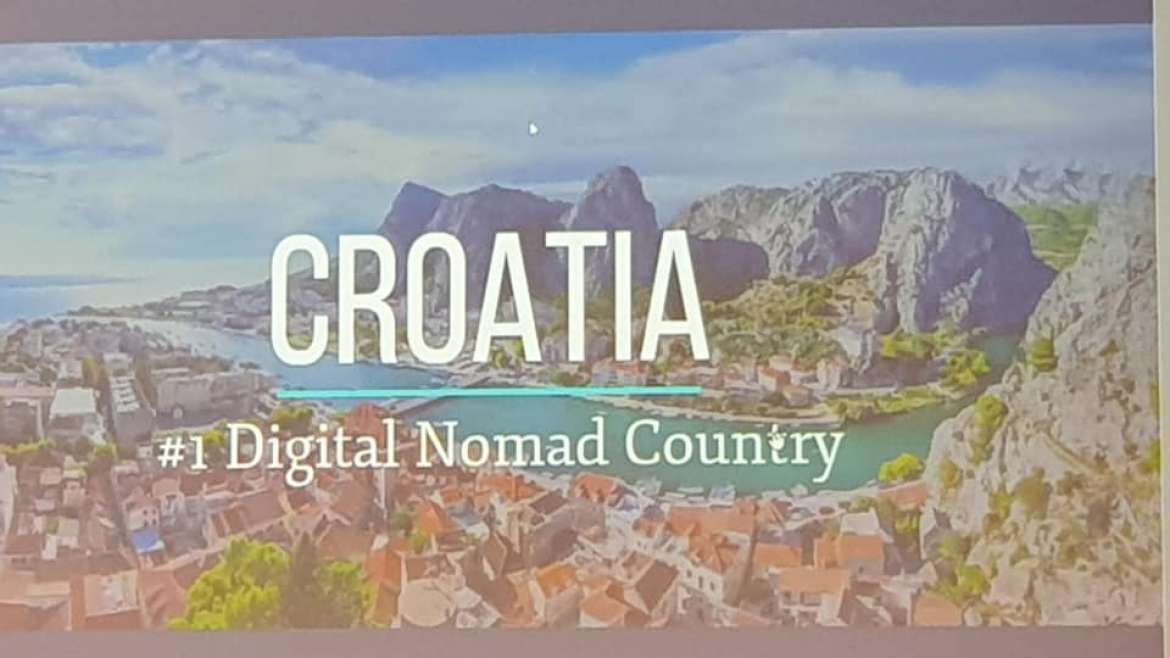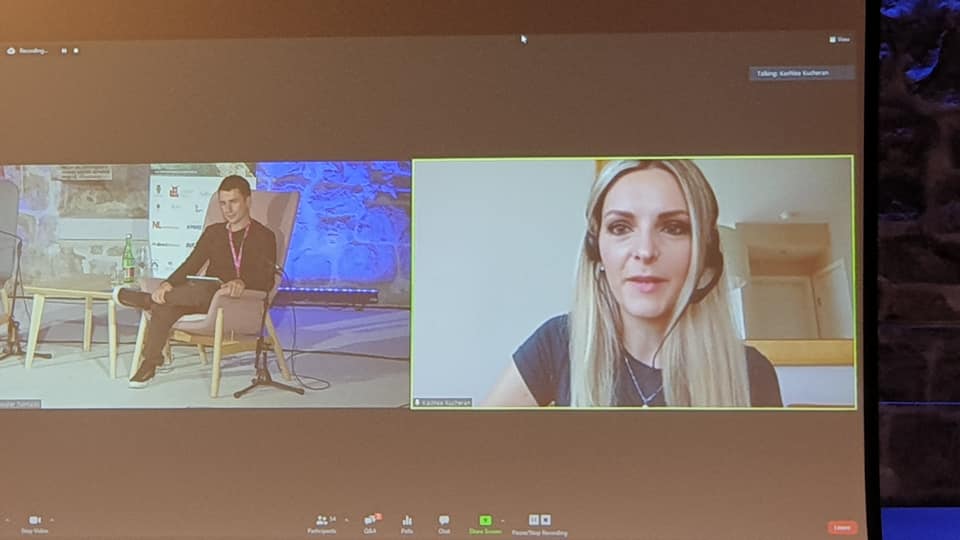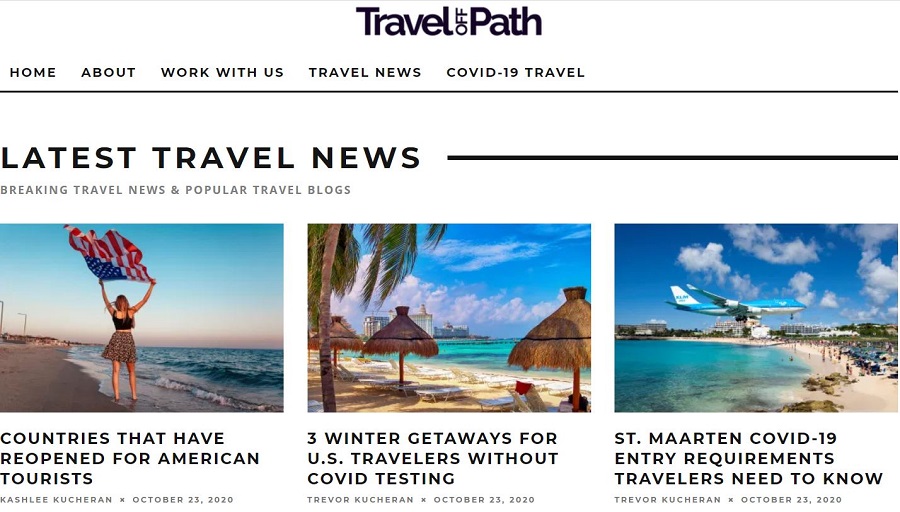American Family in Croatia: They Left Everything Behind to Travel Europe
November 26, 2020 – Traveling the world during the pandemic may seem impossible for many, but not for one American family in Croatia. Despite the obstacles, they are now living their dream digital nomad lifestyle in Croatia.
In the midst of the coronavirus pandemic, when the countries around the world are closing their borders and traveling is kept to a minimum, one young American couple decided to go the opposite way. On October 4th, they took a one-way flight to Europe to pursue their dream of becoming full-time digital nomads.
And they did it right at the time when the introduction of the digital nomad visa in Croatia is increasingly likely.
For a long time, Victor and Klaudia Gonzalez have had a great desire to travel and show their son Augie the splendor of the world. Like many people, they have always wondered how it is possible to turn travel into a way of life with almost no savings. Little by little, as their desire did not subside, they decided to try their luck and embark on the big life journey of moving abroad, to Croatia.
Croatia affordable and welcoming
However, their journey was not easy, since they almost had no budget at all. They met in college 8 years ago in Michigan, USA. Only three years ago, when Victor was finishing college and their son Augie was a toddler, they were even getting government help to buy food. But then things started to get better.
"When Victor finished college, he got his first full-time job. We moved from Michigan to Colorado, where we caught the travel bug camping and doing hiking trips. One year ago, we decided to make our dream a reality. We sold everything for only 1,000 dollars. We didn’t sell a big house or flat because we didn’t have one, and our car wasn’t worth anything to sell," says the couple, explaining that Klaudia was homeschooling and working from home, while Victor was working between 60 to 70 hours a week to save enough money for a plane ticket to Europe.
"We were ready to leave when my mom was diagnosed with stage 3 breast cancer. We stayed with her until she got better, and she was the one who inspired us to follow our big dream," says Klaudia.
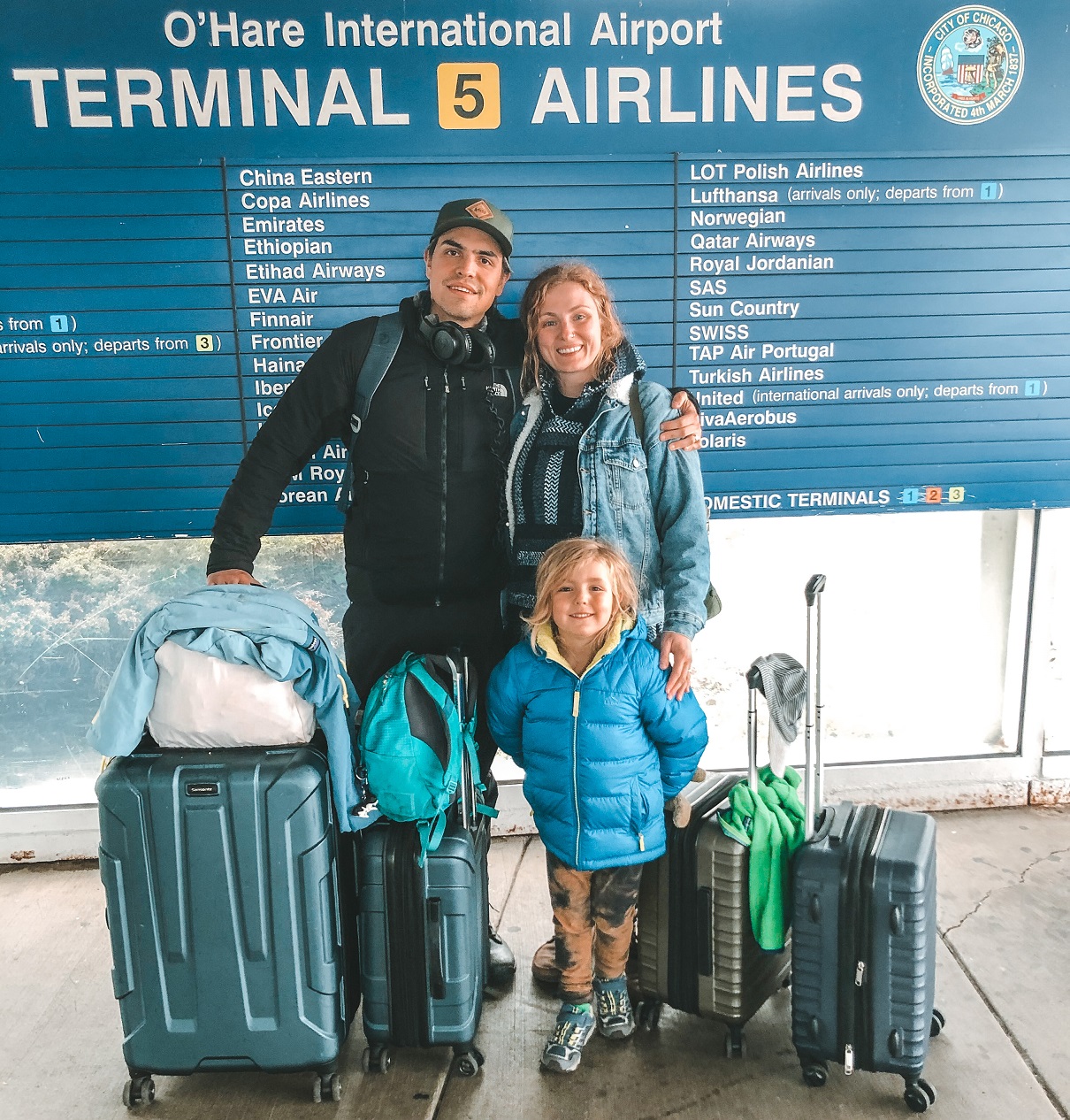
Gonzalez family pictured on the day they left the USA at the Chicago O'hare Airport in October / Private archive
Although their first plan was to move to Poland, where Klaudia's heritage comes from (their son Augie is also bilingual, speaking both English and Polish), Croatia stuck out as their top choice because it was a welcoming destination for Americans during the pandemic. Besides, they note, Croatia is a safe country with ideal weather and a good connection to the rest of Europe.
"Originally we planned to stay for one month, but the quality of life and the welcoming energy has convinced us to wait until after the holidays. We look forward to seeing the Christmas lights in Zagreb. We’ll be in Croatia for almost 3 full months," the couple says, adding that Croatia and the whole Balkan region is a hidden gem, and is both affordable and welcoming.
From the sea to the mountains
"Croatians are such warm and inviting people. Our Croatian host has become a life-long friend, and when exploring inland Dalmatia, Croatian strangers invited us into their home for cherry liquor and baked goods. We won’t ever forget the hospitality of Croatians!" they say.
For now, they have visited Dubrovnik, Split, and Krka and Plitvice Lakes National Parks, and on their Instagram page The Family Journalists where they share their experiences from Croatia, they did not hide their pleasure.
"For such a small country, Croatia has a diverse landscape. We stayed in a flat next to the sea, and within an hour, we were in inland Dalmatia riding an ATV on the top of Croatia’s second-highest mountain," says this couple whose priority was to have remote careers. Klaudia is a teacher and writer, while Victor is a self-taught software engineer.
Full-time traveling on a budget
Their son Augie enjoys his time in Croatia and is always ready for the next adventure. If you ever meet this family on the street, you will probably hear Augie saying his favorite Croatian word: "Bok!"
The only thing that they miss is their families, who won't be there for their son's fifth birthday this year, which they will be celebrating in Croatia. Their initial plan was to stay in Croatia for one month, but now they decided to stay until spring when Klaudia's parents visit them from the USA.
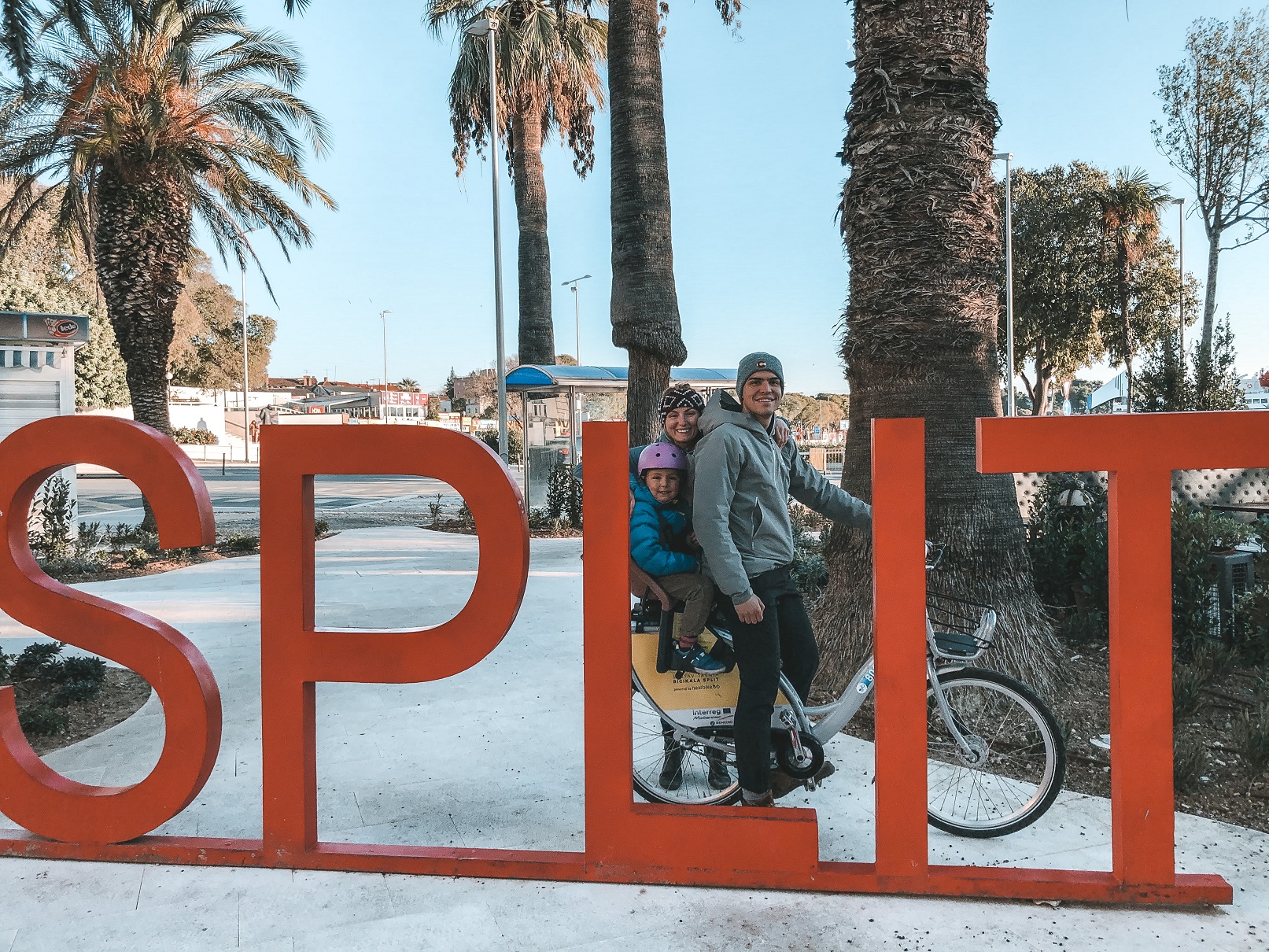
Exploring Split and Čiovo island / Private archive
Nevertheless, their return to Croatia is not ruled out.
"With the introduction of the digital nomad visa, it will become even easier for Americans to visit Croatia or come back," Klaudia says.
"We want people to understand that it's possible to travel the world as digital nomads with hard work. It’s possible for those that don’t have a lot of savings to travel full-time by making a budget and visiting more affordable European countries like Croatia. Now we travel with four suitcases and two backpacks as The Family Journalists interviewing locals and sharing stories from around the world," says the happy family.
To read more about digital nomads in Croatia, follow our dedicated page.
Croatia Through the Eyes of a Digital Nomad: Croatia's Endless Summer Sport
November 26, 2020 - Continuing our look at the digital nomad lifestyle in Croatia, it may be late November for some, but Croatia's endless summer sport continues for some.
The Adriatic Sea is a focal point for seasonal visitors to the Dalmatian coast for good reason; it’s positively refreshing on hot summer days. But some people swim long after the crowds have gone, when the only onlookers are wearing coats.
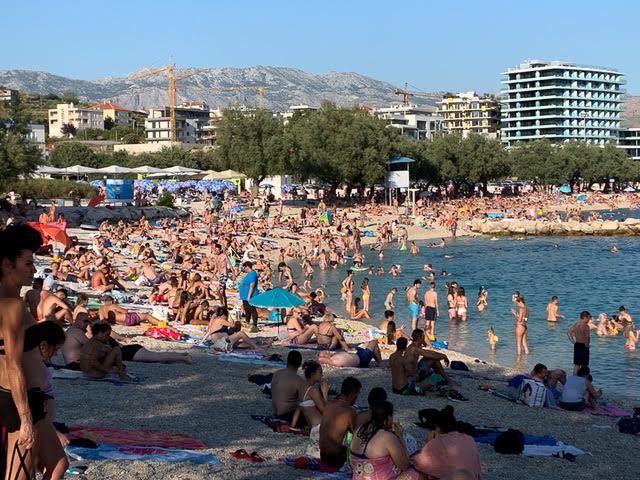
(When summer tourists crowd Split’s beaches, everyone carves out their own spot on the sand and in the water.)
Ever since I heard that Split’s summer weather can occasionally extend into fall, I got it in my head that I wanted to swim as late into the season as possible. Swimming is one of my favorite sports for the feeling of being in the water as much as the exercise. Everything about it signals freedom and expansion, increasing my movement, thoughts, and bodily sensations. I love the open water and Croatia’s total seaside environment—sun, salt, azure sea, temperature, and rugged beauty—is perfect.
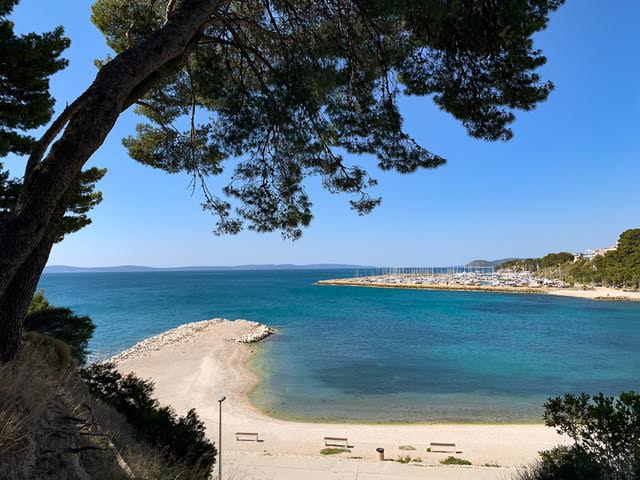
(Pine trees, white beaches, and teal waters are hallmarks of the Mediterranean coastline that draw visitors from around the world.)
Before tourists
Back in the spring, during early morning Žnjan beach walks, I’d end up sitting on a rock with my bare feet dangling in the water. Sure, it was cool outside, but I was bundled up in layers and my feel were thankful to be out of socks and shoes. As I looked over my surroundings, I craved summertime just to be fully immersed in the gorgeous water. When it finally arrived, I plotted my swims—whenever and wherever.
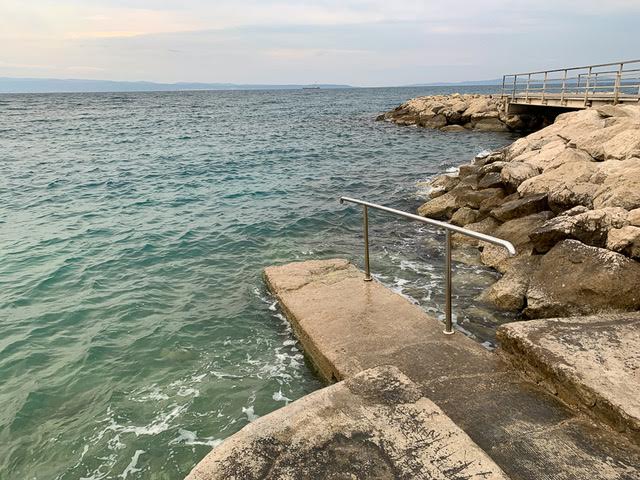
(Ramps and other accommodations are found all along the seaside; they allow people with disabilities to get into the water.)
Island life
A rocky enclave on Lokrum, the Blue Lagoon near Trogir, the famous Zlatni Rat on Brač, and diving off a sailboat were perfect staging grounds for my addiction. I was mindful to soak up every minute in these brilliant surroundings. Sometimes I’d pop my head above the surface and laugh at my good fortune and my happiness; it was pure joy.
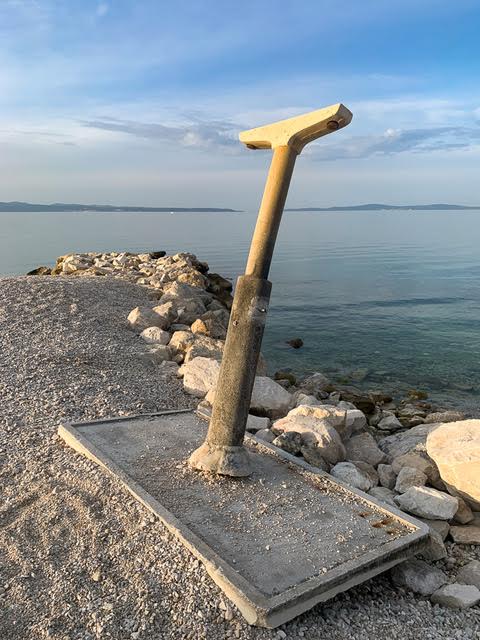
(Shower facilities on every beach look like aliens from another planet.)
Opportunities everywhere
It seems any spot to enter the water is fair game. Croatians will climb through large rocks and pull their cars to the side of the road just to take a dip. I learned to toss my bathing suit and travel towel in a bag when meeting friends because an opportunity could pop up any time. After visiting a bee farm on Šolta, I swam before coming home because why not try another island, right? When biking around Marjan Park, I pumped my brakes at the sight of Kašjuni beach and promptly turned back to join the bathers. Dalmatians inherently love the sea and for them, this behavior is second nature.
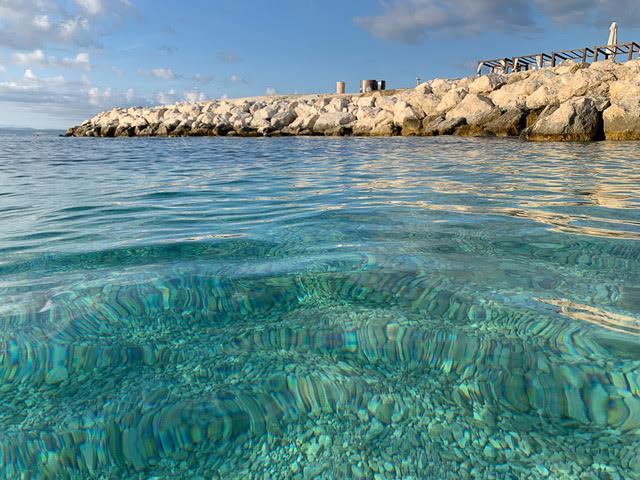
(View from just above the surface, where colors and textures from above and below the water meet.)
Ideal weather
September, October, now November… and I’m still checking the sea and air temperature daily. My bathing suit hangs on a doorknob as a visual reminder; each day I hope it’s the right one. So far quite a few have worked out, even though we’ve passed the Daylight Savings mark on the calendar. Back home my swim gear would’ve been packed away months ago. The Atlantic Ocean is not this agreeable.
Getting cooler
Let’s be real though, things are cooling down. On both ends of these late fall days I wear proper fall clothes. Yet, today the water and air temperature were nearly equal at 18.8ºC (65ºF) and I swam effortlessly. A small admission: I get cold very easily. The idea of swimming in November is way past my comfort zone and I honestly don’t know how I’m doing it.
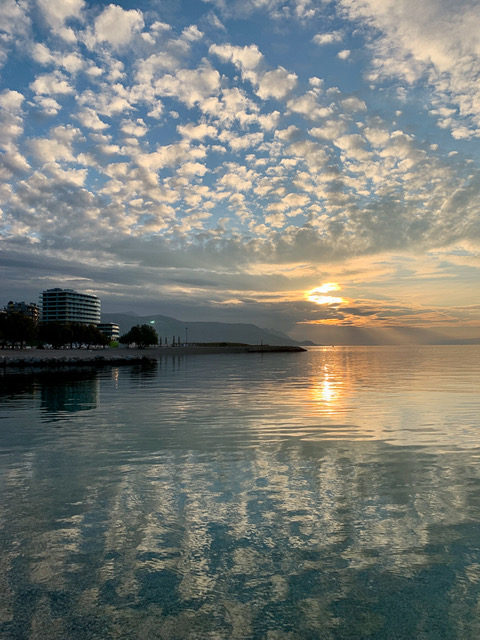
(The morning sky can create the best view for an early swim.)
Still swimming
Perhaps living in a new place brings new inspiration. Or maybe the cold is all in my head. I don’t need to figure it out, I’m still swimming and loving it.
Learn more at TCN’s Digital Nomads channel.
Story and photographs ©2020, Cyndie Burkhardt. www.photo-diaries.com/
For more of Cyndie's experiences, check out her Croatia Through the Eyes of a Digital Nomad column.
Croatian Digital Nomad Visa Closer as Parliament Changes Aliens Act
November 25, 2020 - Croatian bureaucracy 2.0, as changes to the Aliens Act to accommodate the Croatian digital nomad visa sail through Parliament. We are close, but not there yet.
Split-based Dutch entrepreneur Jan de Jong was back doing what he did so effectively back in July this afternoon, as he penned one more open letter to Prime Minister Andrej Plenkovic via his LinkedIn profile, this time a note of thanks.
Back in July, de Jong sent Plenkovic an open letter asking him to introduce a Croatian digital nomad visa. The response - during the summer holidays - was stunning. Just 44 days later, Plenkovic tweeted a photo with de Jong promising to do just that. By chance, changes to the Aliens Act were due to be introduced to Parliament the next day, and the nomad visa was added to those changes.
Those changes were today ratified by Parliament, leading de Jong to head to his keyboard once more:
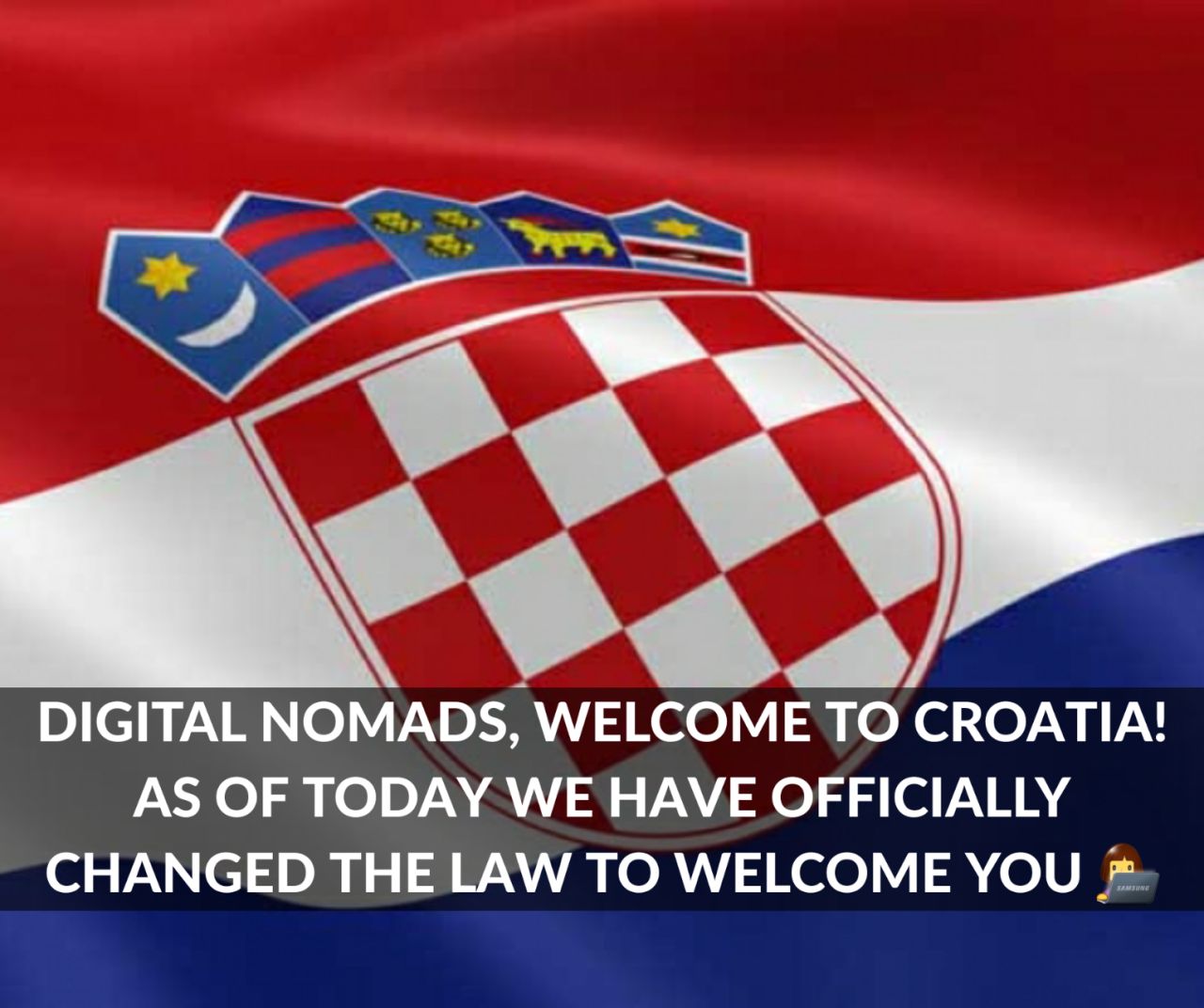
Dear Prime Minister Andrej Plenkovic,
On the 11th of July, I kindly asked you to consider introducing a digital nomad visa in Croatia ?? through my open letter here on LinkedIn.
Today, on 25th of November - with acceptance of the new Alien Act - you have truly delivered, making Croatia among the first countries in the world to welcome digital nomads by regulating their temporary stay.
Thank you Prime Minister for your support from the moment this opportunity was presented to you.
I would also like to thank Deputy Prime Minister & Minister of Interior - Mr. Božinović and State Secretary of Interior Ms. Terezija Gras for your efforts and support.
Last but not least, I would like to thank the 5.269 people here on LinkedIn that supported my open letter in July and all the thousands of other people that supported this initiative from the beginning.
Hvala svima! - ❤ -
Jan de Jong
Follow me on #LinkedIn
Ps. Required changes to tax law and health insurance are expected until 31.12.2020.
#wfh
#Croatia
#DigitalNomads
#livingthecroatiandream
So it would appear that Croatian bureaucracy CAN run rather smoothly.
My understanding from another source is that the issue of digital nomads and tax will be discussed during a government session tomorrow. The ministries involved are all making good progress, and the final issues are expected to be ironed out by the end of the year.
My understanding is that the changes approved today come into effect on January 1, 2021, so IN THEORY, the Croatian digital nomad visa could be available then. Experience in The Beautiful Croatia, however, has taught me to believe it when I see it, and I would be more confident in the prediction that sometime in the first quarter of 2021 is likely.
But if a motivated Prime Minister can move from a LinkedIn post to a change in the law in just over four months, who knows?

Not only is de Jong a successful entrepreneur, he is now rivalling his YouTube star wife Slavica as the family's top multitasker. When I called him for a quote and more info, he not only sent me a link to the parliament decision, but also screenshotted the relevant sections, all this without dropping the Baby de Jong he was holding.
Here is the full parliament decision - it is a riveting read. Google Translate is your friend. The relevant sections are in the screenshots below.
One more hurdle has been overcome. Congrats to all.
For the latest news on this and other digital nomad news in Croatia, follow the dedicated TCN section.
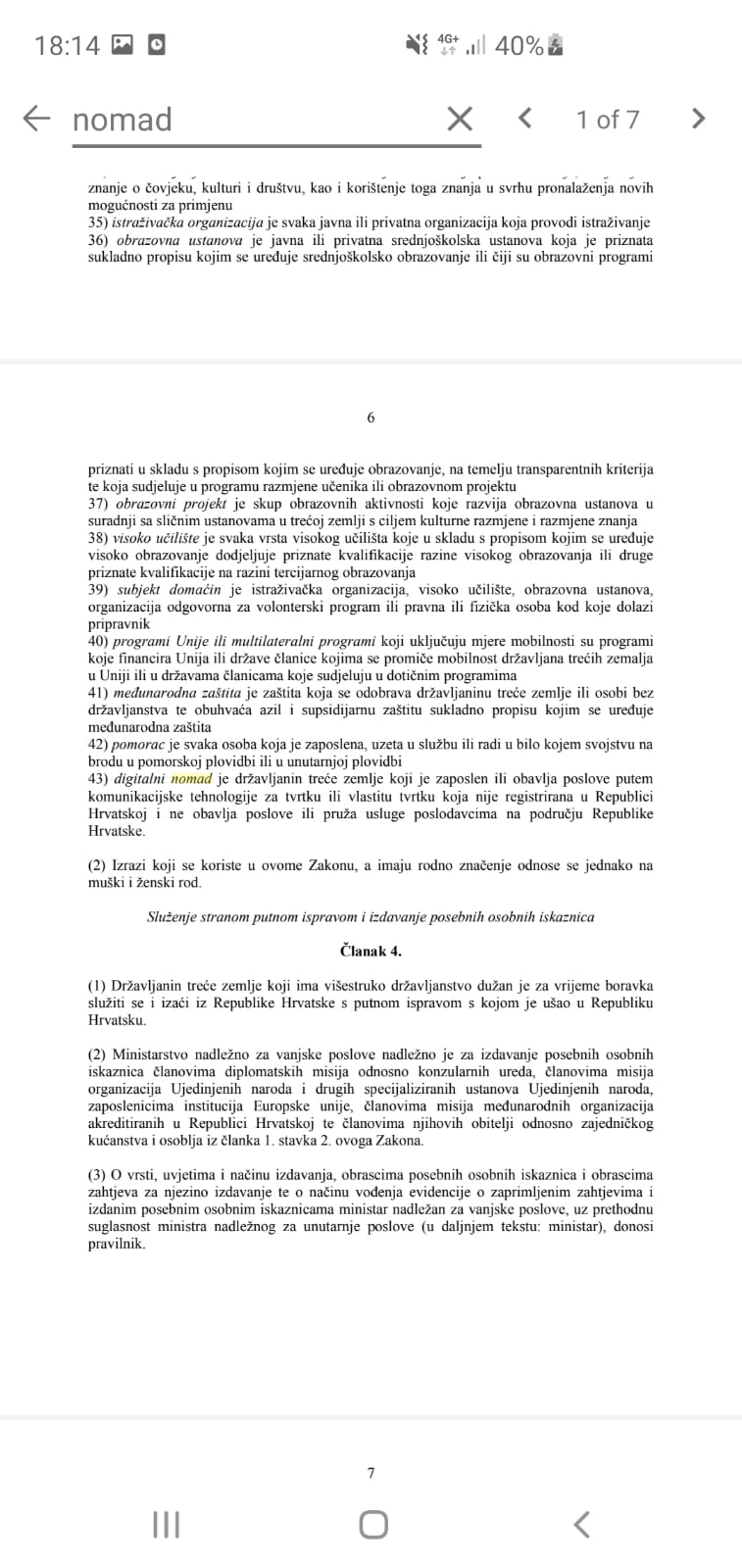
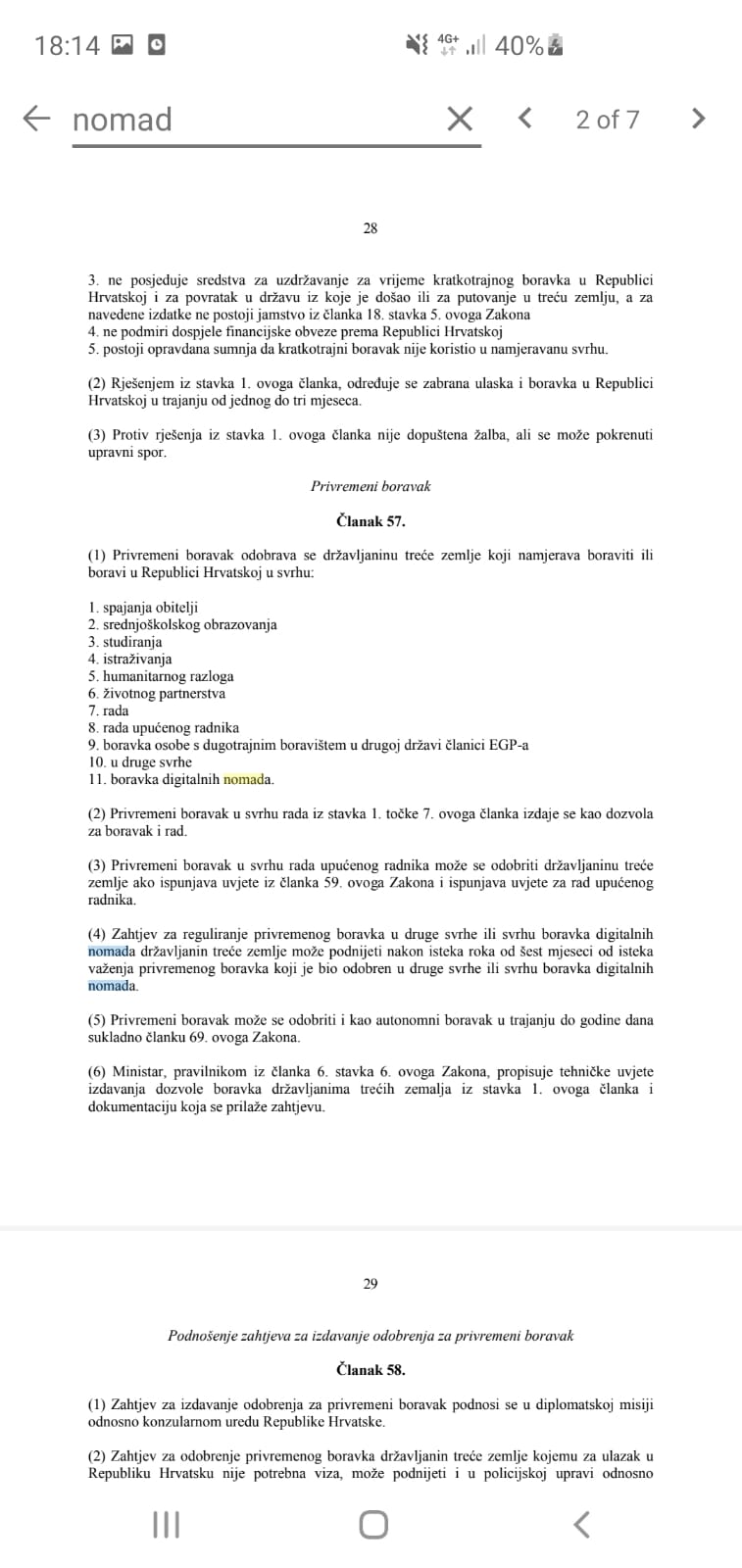
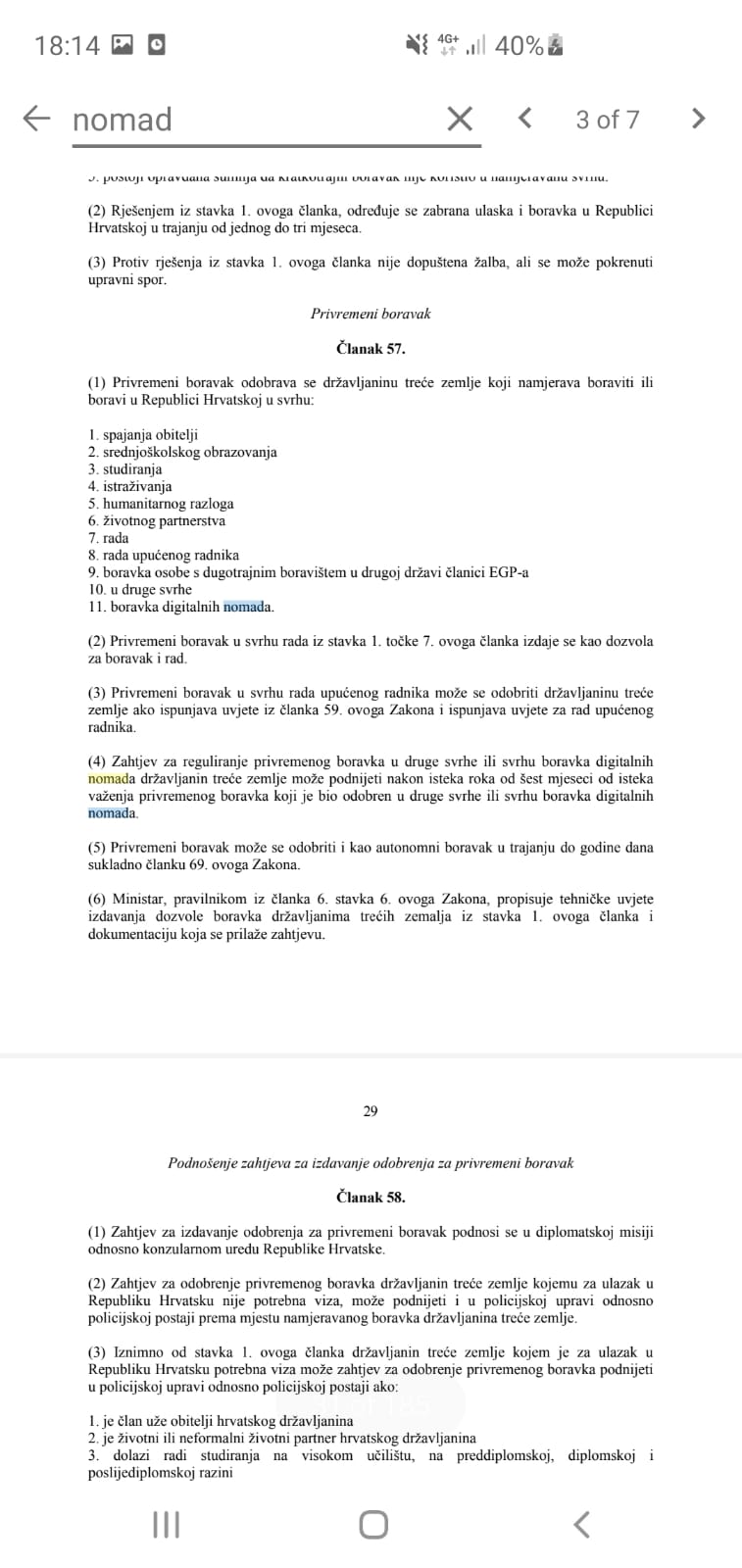
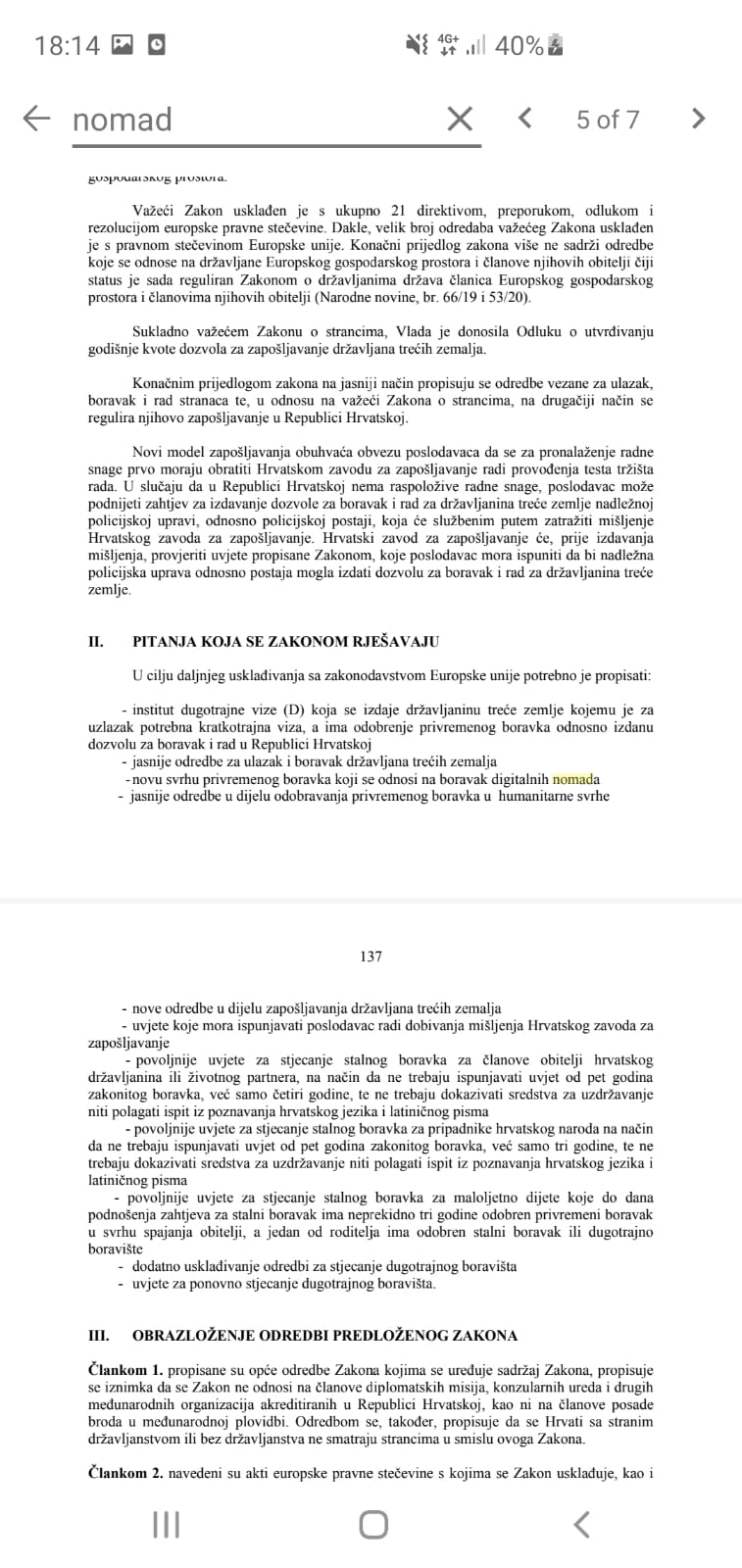
Parliament Passes Foreign Nationals Act, No More Annual Quotas for Employment
ZAGREB, November 25, 2020 - The Croatian Parliament on Wednesday passed the new Foreign Nationals Act under which there will no longer be an annual quota for the employment of foreign nationals.
None of the 32 amendments put forward by the opposition were accepted.
Under the new law, the government will no longer establish an annual quota for the employment of foreign nationals, but employers will be obliged to submit a request to the Croatian Employment Service (HZZ) to conduct a labour market test.
If there are no unemployed persons in Croatia that meet employers' criteria, employers will then submit an application for residence and work permits to the Interior Ministry, which then requests an opinion from the HZZ regarding hiring a specific foreign national. The procedure, including the labour market test, will last a maximum of 30 days.
The act also stipulates exceptions to the labour market test, which is not conducted for shortage occupations, such as carpenters, masons, waiters, butchers, and for seasonal work up to 90 days in agriculture, forestry, hospitality and tourism.
The new act also introduces long-stay visas (visa D) in the event that a third-country national is granted temporary residence for work, family reunification, university education, research and secondary education.
Another novelty is a more favourable regulation of temporary and permanent residence for Croats with a foreign citizenship or without a citizenship who have a certificate from the Central State Office for Croats Abroad.
In addition, family members of Croatian nationals can acquire permanent residence under more favourable conditions, as can foreign minors who have been granted temporary residence for a period of three years and one of their parents has been granted permanent residence or long-term residence.
The act also gives the possibility of regulating the temporary residence of digital nomads, that is, foreign nationals who work online for foreign employers.
The new Foreign Nationals Act enters into force on 1 January 2021.
3 Female Returnees Bring Digital Nomad Work, Play & Living to Diocletian's Palace
November 23, 2020 - What if remote workers could combine the world of digital nomad work, play and living in one place - a UNESCO World Heritage Site and retirement home of a Roman Emperor, perhaps? Well now you can thanks to three enterprising female entrepreneurs in Split.
Having been brought up a Brit, it is hard to admit I have a hero who is Australian. Actually, not one, but three - all inspiring ladies from the Croatian diaspora who moved to Croatia to try their luck in the land of their ancestors.
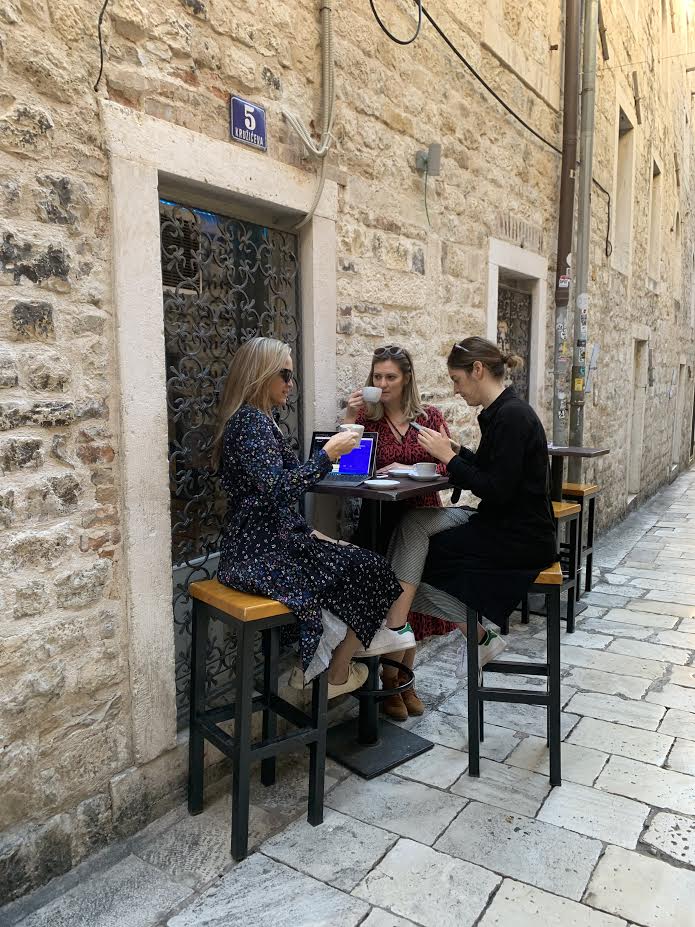
And all three have succeeded, despite the many obstacles thrown in their way. It has been a pleasure to cheer from the sidelines as I have charted their path to success. And now a new chapter, as my three heroes have teamed up together for the first time to offer the option of digital nomad work, play and living in one exciting concept - located in the heart of a UNESCO World Heritage Site and former retirement home of a Roman Emperor no less - Diocletian's Palace in Split.
There is a lot of buzz and talk about digital nomads in Croatia at the moment. A combination of the initiative to make Croatia only the sixth country in the world to offer such a visa, as well as the realisation that Croatia's current accidental tourism 'strategy' needs an urgent reset, has had many tourism providers looking to cater to this new digital nomad tourism opportunity.
Most are completely missing the point.
It has been mildly amusing to see the number of businesses in Croatia who are suddenly advertising themselves as digital nomad friendly, as though a bed and reasonable WiFi is all that is required. While both are a prerequisite, there is a little more to it than that. Two of the major planks of a successful digital nomad tourism offer, at least in my humble opinion, are lifestyle and community. Travelling the world is a rewarding experience, but it can also be a lonely one. If you are working remotely and you can find a place to live, work and play all in one, then that is a lot more appealing.
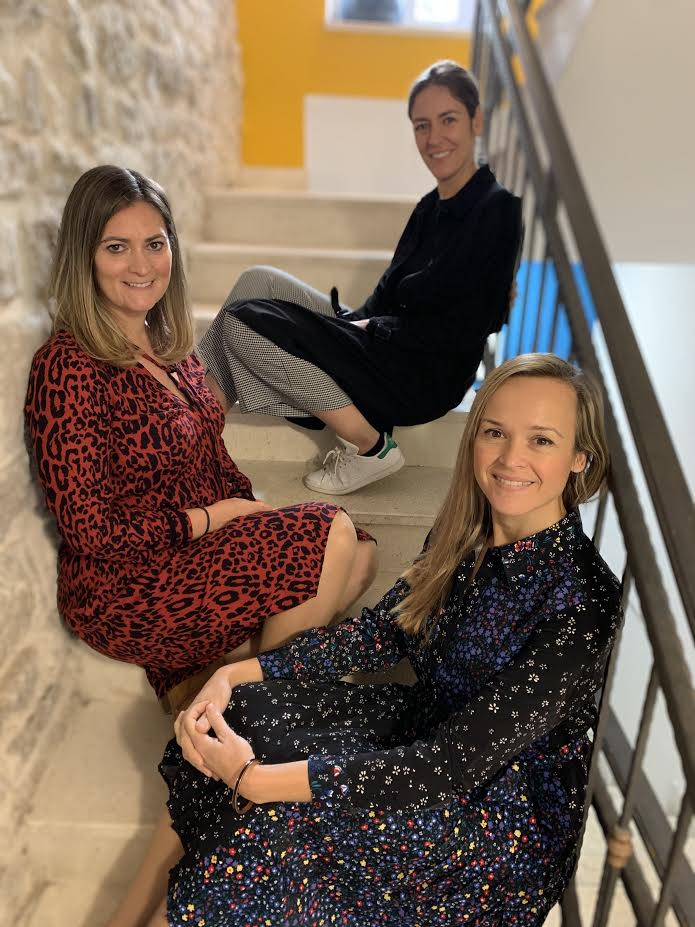
Enter my three Australian heroes - Tanja, Maria and Korana - all of whom will be familiar to longterm readers of TCN.
I have been spending quite a bit of time on and offline with Tanja Polegubic from Saltwater Nomads this year. Founder of a co-working space of the same name in Split, Tanja has put a lot more thought than most into the potential (and the pitfalls) of Croatia embarking on the digital nomad route (and for those interested, 10 Ways Croatia Will Be At The Forefront of Countries with a Digital Nomad Visa is a worthy read). Tanja also organised the first Digital Nomad conference in Croatia last month, is a founder of the Digital Nomad Association, and we will shortly be announcing her latest cool event, a digital nomad boot camp to coincide with Advent in Zagreb.
Maria and Korana are lifelong friends who came to Split as naive 22-year-olds who thought they spoke fluent Croatian almost 20 years ago. As some of the few foreigners who have been working here as long as I have, it is always fun to catch up with them and have a laugh about the good old days. Having famously flooded the main square of Diocletian's Palace on the first day of opening their first business, a fast food joint, they have gone from strength to strength with a combination of determination, vision, charm, sound decision-making and 10 lifetimes of hard work. The first legally registered hostel started the empire which then blossomed into three hostels, one of the most popular hangouts in Diocletian's Palace (Charlie's Bar), and two excellent restaurants, Zinfandel and Brasserie on 7. Life was good for the owners of Zeven Gastronomy Group and Split Hostel Group.
And then came corona.
Not for the first time in their Croatian odyssey, it was time for a rethink, this time over a glass of wine with Tanja. What if all the assets and components of both businesses could be realigned for the greater good? A co-working business, hostels, a bar and two restaurants. What kind of package could that be if it was all made available to customers to work, live and play?
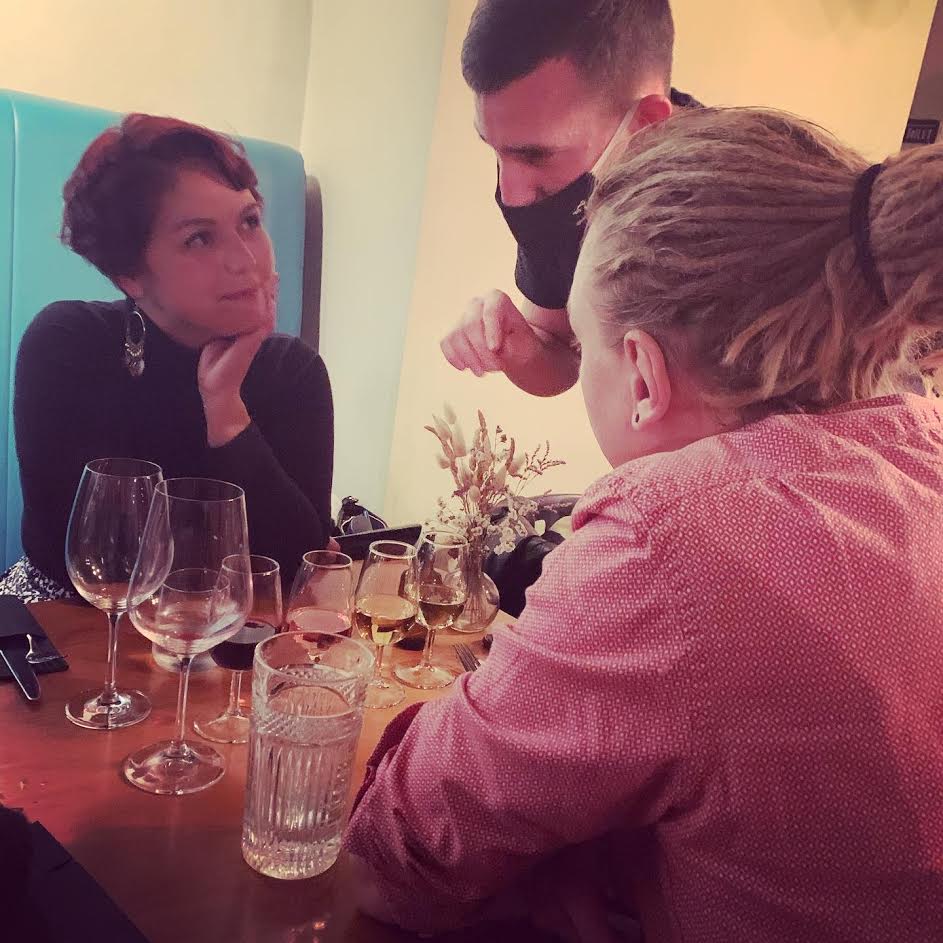
And that is exactly what these three heroes have done. As Tanja explained:
Around mid-September, I was contacted by nomads looking for co-living options. There weren’t any in Split. We already find long-stay accommodation options, so a hostel - especially as they had been hit so hard by Covid19, was a logical option. I contacted Korana, and it started very quickly.
All this was happening while the preparations for Dubrovnik Digital Nomads was underway. Korana and Amanda - our Saltwater member who ran the bar at our Beach Office Bacvice Bacvice this summer.
In our first week of opening, our two top floor “penthouse” private offices (Bill and Ted) filled up! Couples from US/Canada and UK/USA. Since then, we’ve had quite a few people trial, and some join.
Coworking isn’t an easy business - it’s very transient. It is more about the community activity and events. Plus some good ole fashioned Dalmatian ‘pomalo’... things happen slowly here. Which is fine; we’re in this for the long haul. Especially as it’s very fun to run.
So what does the digital nomad work, play and living combination look like?
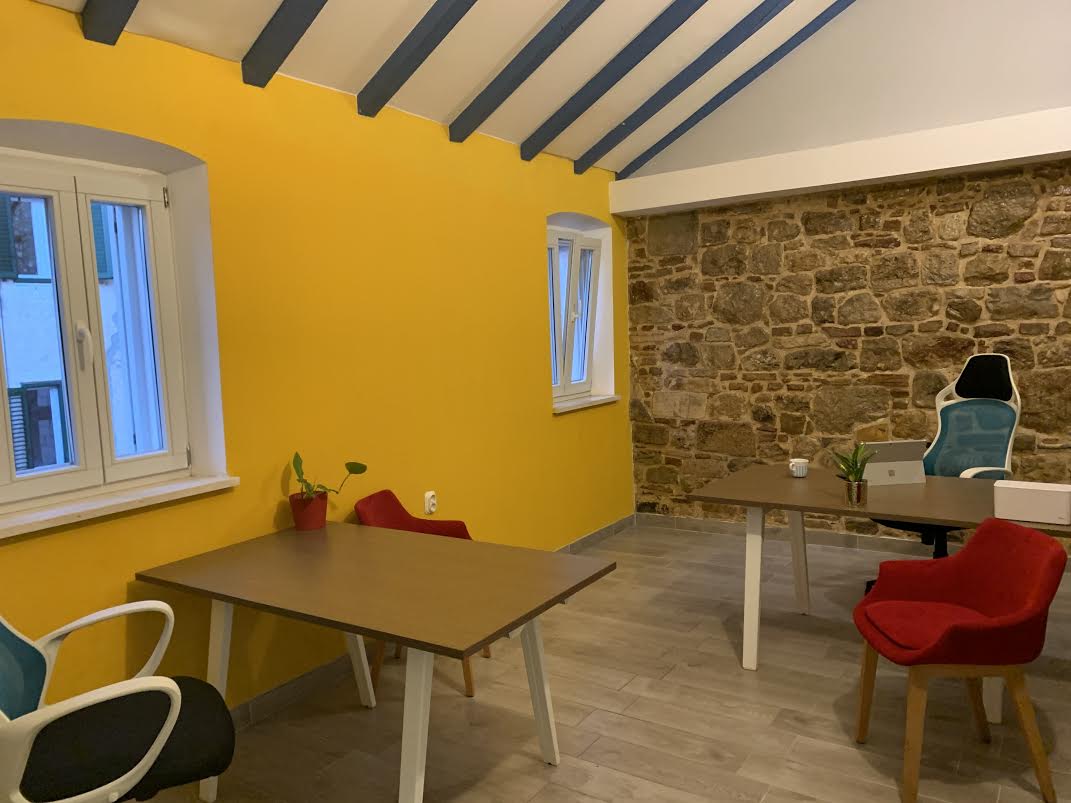
Some of the stone wall hostel rooms have been converted into shared workspaces, private offices, meeting rooms - already fitted out with showers, communal areas and kitchen. And the authentic stone walls as your Zoom background come as standard.
One of the hostels remains as a coliving option - starting at 250 euro month to stay in the Centre of Old Town Split in Diocletian’s Palace.
And what better location for your new office. Not only in a World Heritage Site, but also above the team's Charlie's Bar, offering a steady supply of coffee, cocktails and beer on tap with a nomad discount.
Feeling peckish or looking for a change of workplace scene? Both Zinfandel and Brasserie on 7 are available with discounted prices for registered Saltwater and Split Hostels customers. And with B7's fabulous waterfront location at the centre of Split's famous riva, there are few better more beautiful locations for a temporary office.
The sense of community is crucial to a happy experience, and all three of these fabulous ladies have long experience in producing outstanding customer service, and so it is no surprise that this new nomad offer comes with a little fun in addition to the basic services.
The weekly Nomad Table combines food, wine, entertainment and great company. Education of Croatian wines are already proving popular, a Zinfandel speciality, and some ice-breaking games at the events so far have helped bring people together. The first, held on the inauspicious date of Friday 13, 2020 (what could possibly go wrong?) included an icebreaker game lining up cards with guest and staff point of origin and distance to Split. The furthest away was Hamilton, NZ - although this was strongly contested by Dunedin and Taupo hometowners!
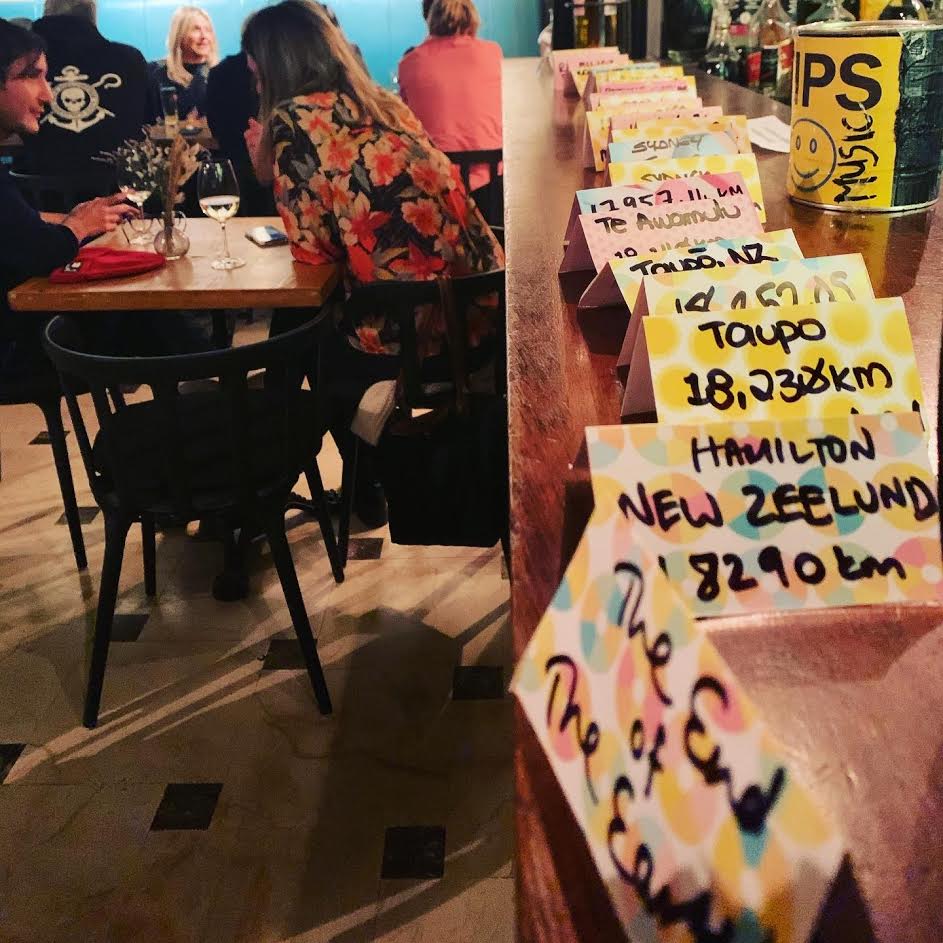
Last week, the Crljenak, Plavac Mali and Posip was washed down with COVID bingo - “68 late for your Tinder Date, 83 Gluten Free and 88 Wills and Kate”. It’s very 2020.
The next event is on Friday 27th - a wine flight and group dinner, with another icebreaker game to be decided. And every Friday and Saturday has live music.
Word of mouth seems to be moving quicker than even the most dedicated blogger. Several Zagreb nomads are heading south for a taste of a Mediterranean winter. So far there have been nomads from Paraguay, USA, UK, Canada, Chile, Australia, New Zealand, France, Germany, Hong Kong, Korea, and a couple from Poland who are sharing their newly adopted home with people back home on Ewa’s Let's Split blog - documenting their journey from Poland to their new home in Croatia.
Did I mention customer service? New vegan options are being added to the menu, as three of the early members are vegans.
Fabulous stuff, and I look forward to seeing how this initiative evolves. With the connections and creative minds of the founding mothers, the prospects are enticing indeed.
The potential of digital nomad tourism in Croatia - with or without the visa - is immense. In order to take advantage properly, it will require a little more than a bed and a good WiFi connection. Good luck to my three heroes - I have been saying for a while that Croatia needs to move from Croatia, Full of Life (whatever that means) to Croatia, Your Safe, Authentic, Lifestyle destination. The Zeven Hospitality Group/Split Hostel Group/Saltwater partnership does exactly that.
For more information, you can contact the team via the Saltwater website.
For the latest digital nomad news, follow the dedicated TCN section.
Arena Hospitality Group Announces Offers for Digital Nomads
November 13, 2020 - Arena Hospitality Group announces offers for digital nomads in a selection of its camps and hotels.
HRTurizam reports that the current crisis situation caused by the global coronavirus pandemic has shown that, thanks to the application of digital technology, we can do most of our work both in the office and anywhere else. It is enough to have a laptop, a mobile device, and a quality internet connection.
This fact was recognized and quickly adapted by the tourism sector, and many hotel companies, both global and Croatian, offered special offers targeting digital nomads and opened their hotels for business guests who use the hotel as an office.
Thus, Arena Hospitality Group (AGH) announced special offers for digital nomads in its camps Arena Grand Kažela and Arena Stoja, which are open all year round, as well as the hotel Park Plaza Histria in Pula.
“Arena Hospitality Group is always open to new market challenges, ready to provide our guests with the complete service they need not only for vacation but also to do business during their stay in hotels and camps. Staying at camps Arena Grand Kažela and Arena Stoja enables an escape from the hectic, dynamic, and regular rhythm that has become our everyday life. Untouched nature enables you to experience the beauties of autumn and winter, and at the same time perform all business tasks and obligations without hindrance," AHG points out.
In the mentioned open camps, high-quality digital infrastructure is provided throughout the year, which, in addition to the existing quality of mobile home accommodation, satisfies both private and business needs.
AGH has provided the minimum necessary for digital nomads: self-check-in (contactless), contactless payment, super high-speed Internet, Netflix, Ott iPTV service for watching TV channels in every part of the camps via mobile devices, and a mobile application for the best guest experience.
As part of this year's World Tourism Exchange WTM in London, AHG received recognition from the world organization "Responsible Tourism Partnership" for responsible tourism and coping in the covid-19 pandemic.
For the latest travel info, bookmark our main travel info article, which is updated daily.
Read the Croatian Travel Update in your language - now available in 24 languages.
Croatia is One Step Closer to Introducing Digital Nomad Visa
November 11, 2020 – Last week, the Croatian government took the first step to introducing a digital nomad visa. In his statement, Prime Minister Andrej Plenković pointed out that the Law on Foreigners, under which the digital nomad visa is regulated, is an important law.
As Lider Media / Nikolina Oršulić reports, the first concrete regulatory steps have been taken to legalize the residence and work of digital nomads in Croatia. Namely, on Thursday, November 5, 2020, at the Government session, the final proposal of the Law on Foreigners was adopted, which will be sent to the Croatian Parliament.
"I think this is an important law. We are among the first countries to legally regulate the issue of digital nomads, and this will be accompanied by appropriate changes to the law in the tax domain, as well as in the health insurance domain," said Prime Minister Andrej Plenković, announcing further legislative steps.
The idea of launching digital nomad visas was first presented in Croatia by Dutch entrepreneur Jan de Jong, who has been building new business opportunities in Croatia for more than a decade.
"I can say that I am satisfied with the pace at which we are working to bring the legislative package needed to attract digital nomads to Croatia. We are currently making great steps forward in answering health insurance questions. With the Prime Minister's statement, we have an official obligation from the highest political level to continue to make extraordinary efforts to adapt the laws regarding taxation and health insurance. I am happy that Croatia will become the leading country in the world in attracting digital nomads," said the entrepreneur for Lider Media.
The legislative story has heated up, so the initiator of introducing a digital nomad visa is already working on the next step – the establishment of a kind of central point to support digital nomads.
"Since we are going in the right direction, I am working on establishing the Croatian Association for Digital Nomads (Digital Nomad Association Croatia - DNA Croatia) whose mission will be to connect digital nomads in Croatia and support them. We are currently in the process of founding this association," said de Jong, who is entering the project with Tanja Polegubić, a returnee from Australia who runs Saltwater Nomads - remote work and lifestyle services for digital nomads in Split, and Karmela Tancabel, a member of the Ilok Cellars (Iločki podrumi) Marketing and Export Board.
The plan is to complete the legislative part to introduce a digital nomad visa by the end of the year, and visas should be available in the first quarter of 2021. In addition to the legal regulation of the status of digital nomads, the draft of the Law on Foreigners brings some other changes.
"The most important novelty is prescribing a new model of employment of foreigners, according to which the employer must first request the implementation of the labor market test from the Employment Bureau to find labor on the domestic market. If there are no unemployed in Croatia, then a request is sent to the Ministry of the Interior seeking an opinion from the Croatian Employment Service. Exceptions to this test are for deficit professions that are usually used during the season," said Interior Minister Davor Božinović at the Government session.
In the draft of the Law on Foreigners, a digital nomad is defined as a third-country national who is employed or performs business through communication technology for a company or own company that is not registered in the Republic of Croatia and does not perform work or provide services to employers in the Republic of Croatia.
For the latest about the digital nomad scene in Croatia, follow the dedicated TCN news section.
Croatia Through the Eyes of a Digital Nomad: Dubrovnik’s Lazareti Backstory Still Resonates
October 28, 2020 - Freelancers Week may be over, but digital nomads are still making connections with one another and with coworking spaces, including the historic Lazareti in Dubrovnik.
My first experience with European Freelancers Week (#EFWeek2020), which just wrapped up, was a whirlwind from beginning to end. I worked in three different coworking spaces, learned how to open and operate an obrt, and socialized with a group of fellow “remote” females. From all this networking, a new project landed on my plate and began the same week. Awesome! The most memorable experience though was working on a kick-off event—the Dubrovnik for Digital Nomads conference.
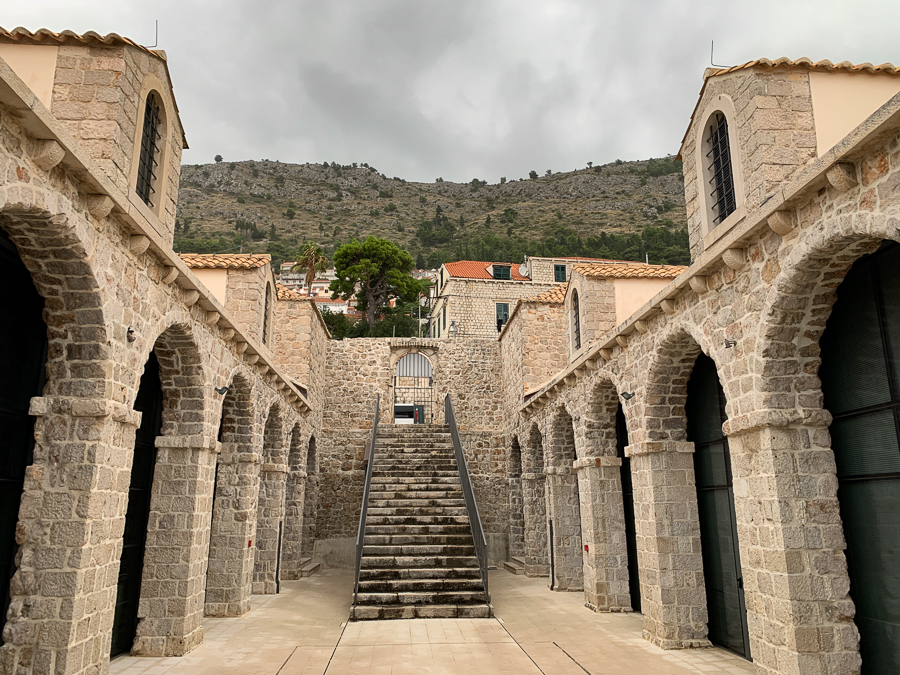
(When epidemics spread rampantly in the 14th and 15th centuries, the Dubrovnik Republic took strict measures to organize sanitary and public healthcare services throughout the region. It’s no coincidence that epidemics of infectious diseases erupted and the period was characterized by a boom in trade.)
Independent work and workspace
Freelancers Week, the parent of #EFWeek, is a celebration of independent professionals and coworking spaces. The conference delivered on both, as a salute to Croatia’s impending digital nomad visa and with an offer of free coworking for the week. The event and the coworking were located in a place of historic consequence—Dubrovnik’s famed Lazareti. Ths row of buildings on the city’s waterfront is notorious as a former quarantine site. Hello, pandemic?
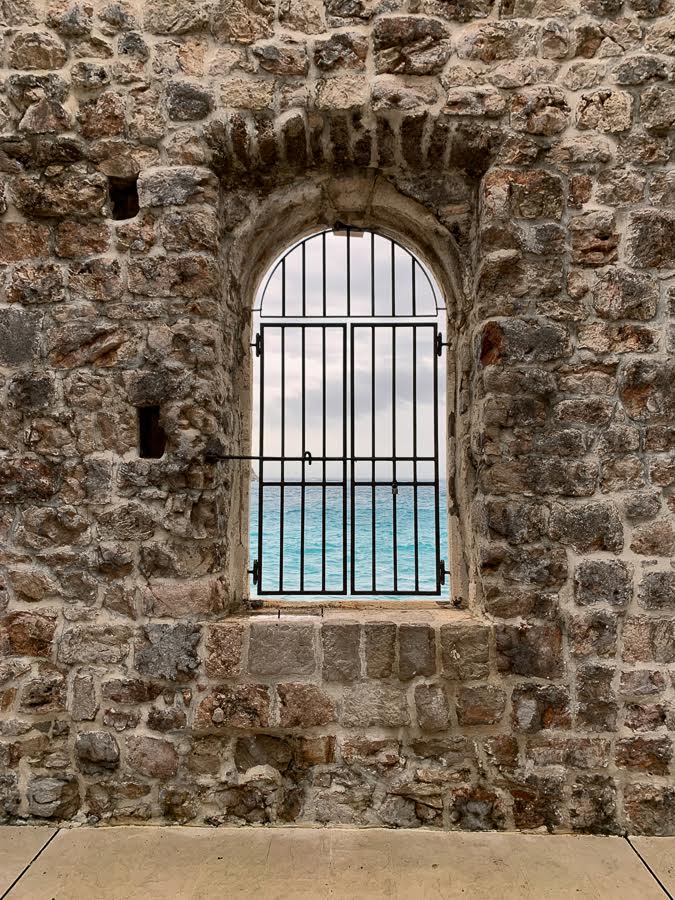
(Small windows in each courtyard were once doors where goods were unloaded from ships, directly into the lazaretto for holding.)
Quarantine origins
Poking around the buildings before the conference, I noticed an art exhibit on the walls. It was actually an illustrated account of the city’s quarantine origins. Dubrovnik was the first state in the world to institute an official quarantine system to protect its people against infectious diseases. “Our Lord God sent a terrible, unheard of judgment on the whole world…” The opening sentence of the prologue wasn’t exactly factual, but it got me wondering if the same God is in charge today, 600+ years after this story began. Don’t get me started…
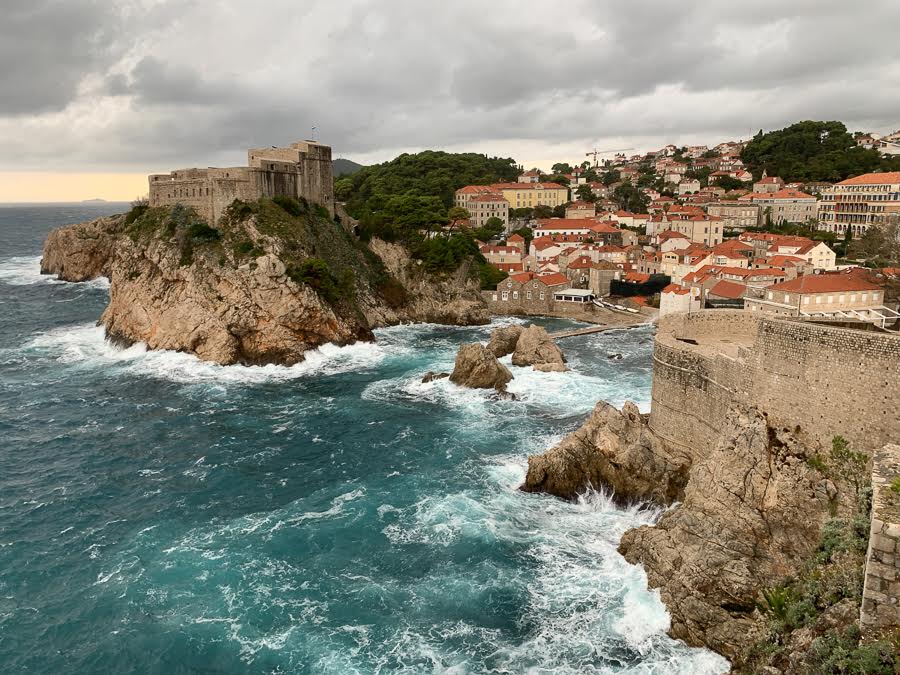
(People who received a prison sentence for violating quarantine restrictions were held at Lovrjenac Fortress, just outside Dubrovnik’s city walls and the Pile Gate.)
Epidemics across the Mediterranean
Raging plague and cholera epidemics were common from the 14th to 18th centuries across Europe and Asia. During these Middle Ages, Dubrovnik was a thriving maritime Republic that received people and goods from all over the world. In 1348, the Black Death plague decimated the population and killed roughly one-third of its citizens. Although infectious diseases were largely attributed to poor hygiene and poor nutrition, treatments were ineffective. It was thought that isolating people who were infected would stop the spread. Three decades later, in 1377, the Republic announced quarantine measures. They targeted all travelers, merchants, sailors, and goods arriving from "suspicious lands." An isolation period of 40-days was mandated and only when a person was proven healthy would they be allowed into the city.
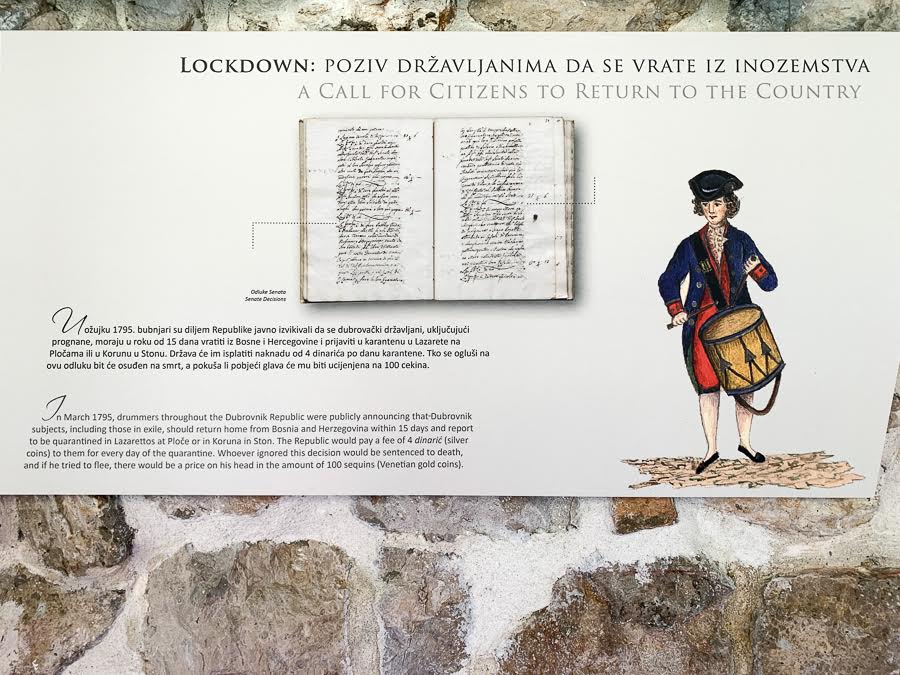
(In 1795, drummers in the Dubrovnik republic publicly announced that subjects in exile should return home and report to quarantine. The Republic would pay 4 dinarić (silver coins) for every day of quarantine. Whoever ignored this would be sentenced to death. If he tried to flee, a price would be put on his head of 100 sequins (Venetian gold coins).)
Lazarettos
The first lazarettos—quarantine stations, were built on remote, uninhabited islands just off the coast—Bobara, Cavtat, Mrkan, and Supetar. Over time, as others were constructed on different islands, including Lokrum, they became complex institutions. Scribes, guards, gravediggers, cleaners, priests, barbers, and healthcare officers were employed. The latter implemented quarantine restrictions and supervised compliance. Penalties for rule-breakers ranged from fines (100 ducats), to prison sentences, severe corporal punishment, and the threat of being shot. Seamen and their families received special dispensation. Since sailors typically had to return to sea immediately after their quarantine, wives and families were allowed to join them and quarantine together at the lazarettos.
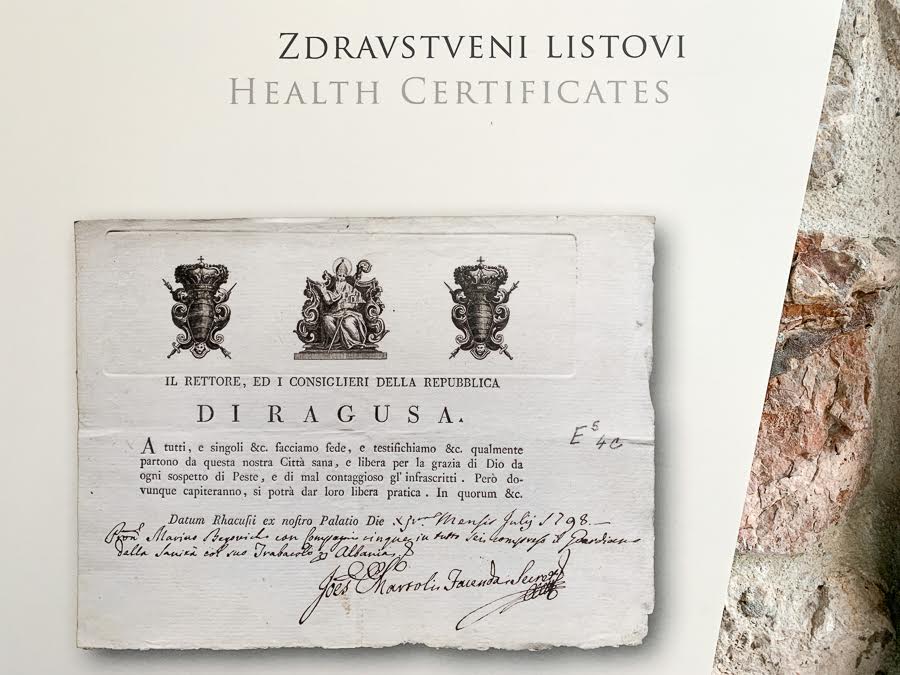
(In cooperation with the Health Office, the Republic issued health certificates to confirm that passengers in Dubrovnik had undergone the prescribed quarantine, or to state there was no infection in the area at the time of their travel.)
Safety measures
Reading about various safety measures—from hundreds of years ago mind you, they were surprisingly familiar. There was contact tracing, decontamination of food and animals, disinfection of ships and buildings, self-isolation, lockdown, border closure, contactless payment, distance rules, prohibition of public gatherings, and more. Contact tracing in the 1600s? Yep. People reported who they had contact with and also what they saw and heard about others. They snitched! Supposedly, it worked, and the plague of 1691 was snuffed out in three months. Contactless payment? Yes, again. Place your ducats on the counter and the person on the other side swept them into a drawer with a stick.
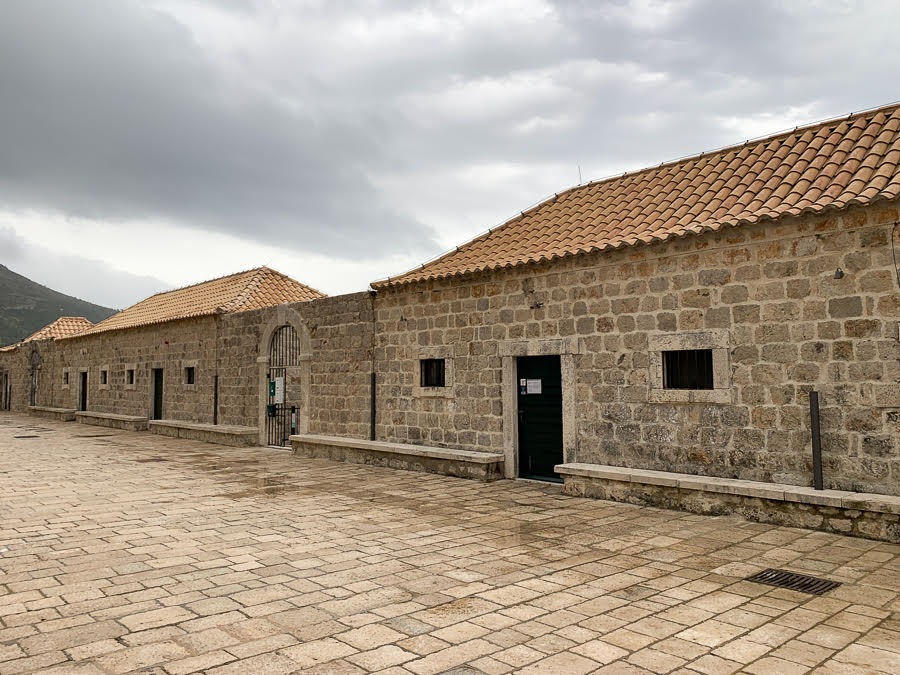
(Buildings along the upper courtyard of the lazaretto were once holding facilities for travelers to quarantine before embarking. Today they house various businesses and artistic ventures.)
Lazareti
The Lazareti, located near the Ploče Gate, was completed in 1647. Its location is significant—situated next to Dubrovnik’s old port and the city’s main entry point. As my feet walked through this multi-story lazaretto, consisting of eight buildings and five interconnecting courtyards, I noticed the architecture that once sheltered people, goods, and caravans from afar. From the shared, upper courtyard at street level, large staircases lead to the individual, lower courtyards at sea level. From the top of each staircase you get an expansive view of the sea, the city walls, and the old town. Peering down, a single, barred window in each courtyard gives you a sweet view of the water. This creates a neat “picture in picture” visual effect yet, standing next to the window there’s an immediate awareness of being behind bars. You’re on the inside looking out.
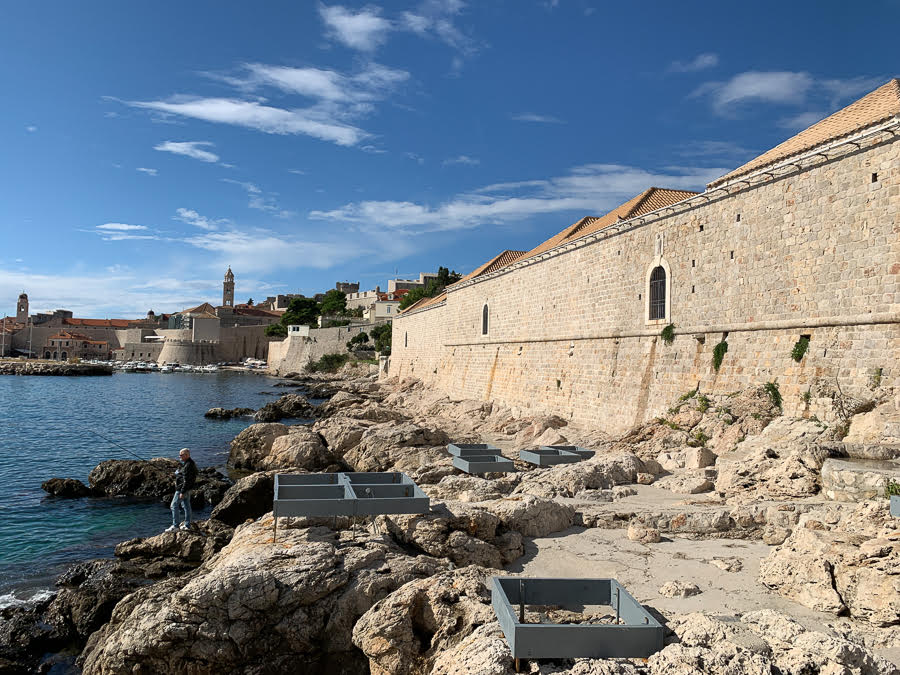
(The lazarettos, consisting of eight buildings and five courtyards, were renovated in 1623 from the sea side in order to enable the landing of large boats. The complex included warehouses for goods and livestock and lodgings for the extended stay of merchants and travelers in isolation.)
Creative Quarter
Physically being in a place whose historic narrative of plagues parallels our current situation with covid-19 in many ways, gave me a surreal feeling of connection. It was a sense of “we’ve been here before, things will get better, I’m not alone.” It’s clever marketing to host a public event and a coworking space in a former isolation facility—during a pandemic no less! As a remote worker, I’m isolated every day at my home “office,” aka my kitchen table. This past week was a breath of fresh air, quite literally, at the Lazareti. I’m glad for European Freelancers Week and the opportunity to get new perspective.
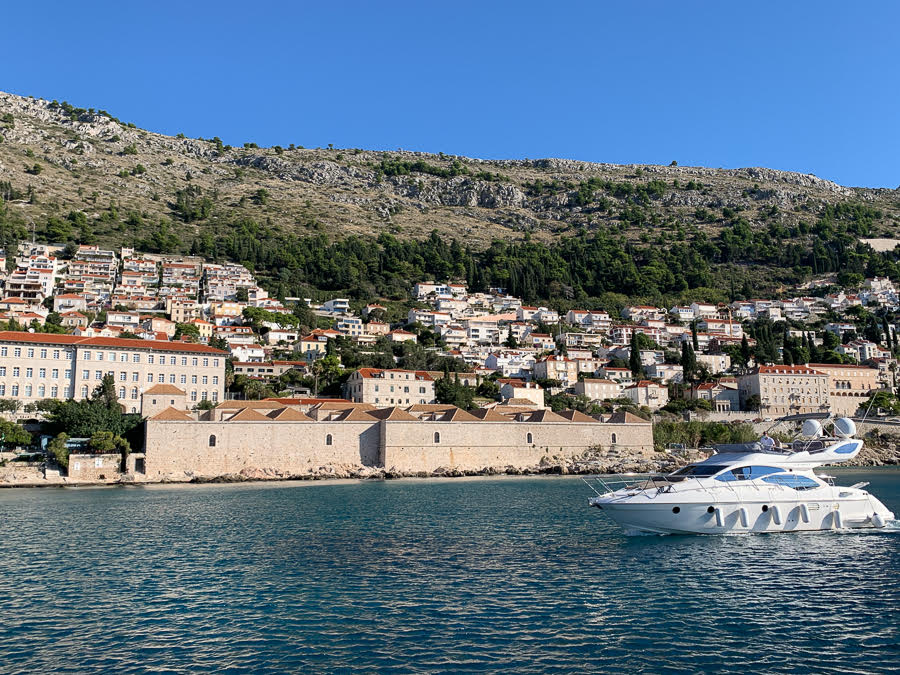
(In the 17th century, Dubrovnik was the largest merchant transit center on the Adriatic and the lazarettos were one of the best organized quarantines in the Mediterranean.)
Story and photographs ©2020, Cyndie Burkhardt. www.photo-diaries.com.
You can follow the latest from Cyndie's column, Croatia Through the Eyes of a Digital Nomad here.
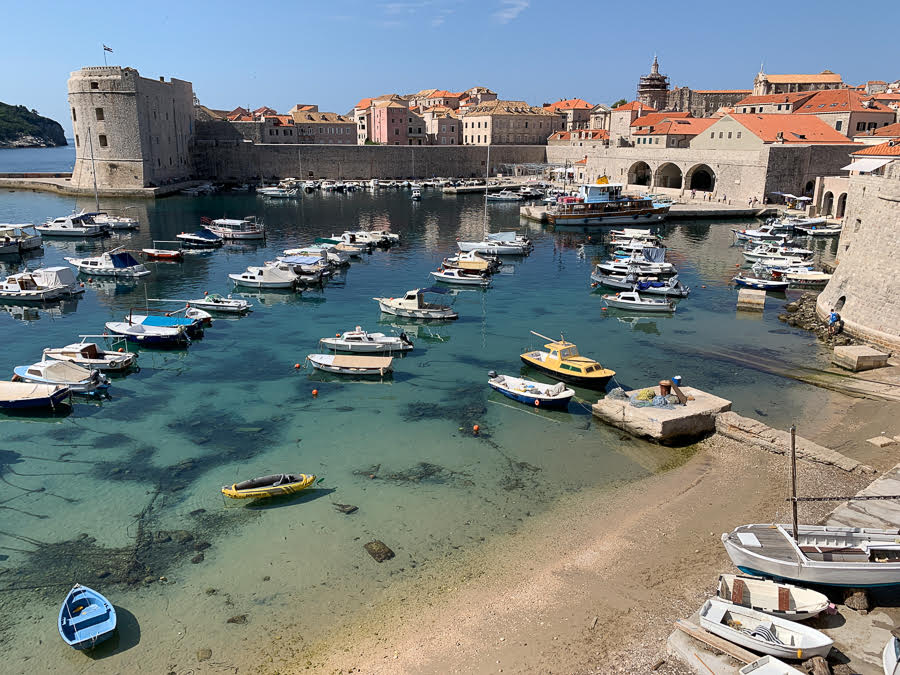
(From the upper courtyard, you get an expansive view of the harbor and the old town.)
For the latest news about digital nomads in Croatia, including that sought-after nomad visa, check out the dedicated TCN digital nomad news section.
Learn more about the Dubrovnik for Digital Nomads conference.
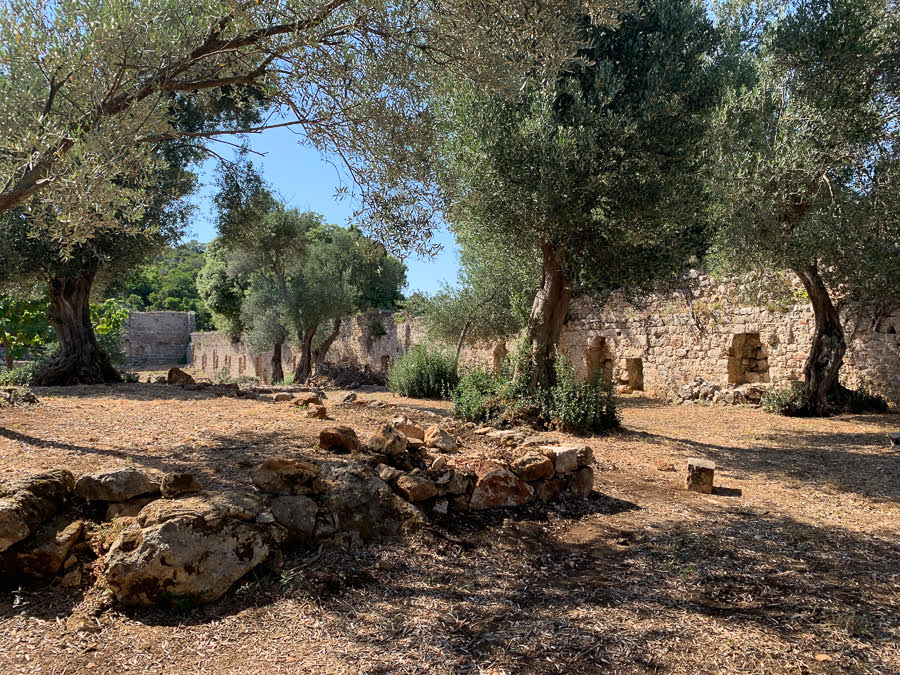
(A large lazaretto on Lokrum, under construction in 1534 was never finished but its remains are still visible. Benedictine monks planted an olive grove in the central courtyard.)
TravelOffPath's Kashlee Kucheran on Croatia's Digital Nomad Potential (Interview)
October 24, 2020 - As the final details of its digital nomad visa are ironed out, a look at Croatia's digital nomad tourism potential from a global perspective via Kashlee Kucheran of TravelOffPath.
It has been a challenging year to be a travel blogger.
Back in March, as Croatia locked down and TCN provided its comprehensive COVID-19 coverage, including daily live updates, life was not much fun. While the information and updates were appreciated by many, writing about death and disease 7 days a week took its toll, quite apart from the challenge of trying to keep on top of the information in a fast-changing situation. And we were only focusing on one country.
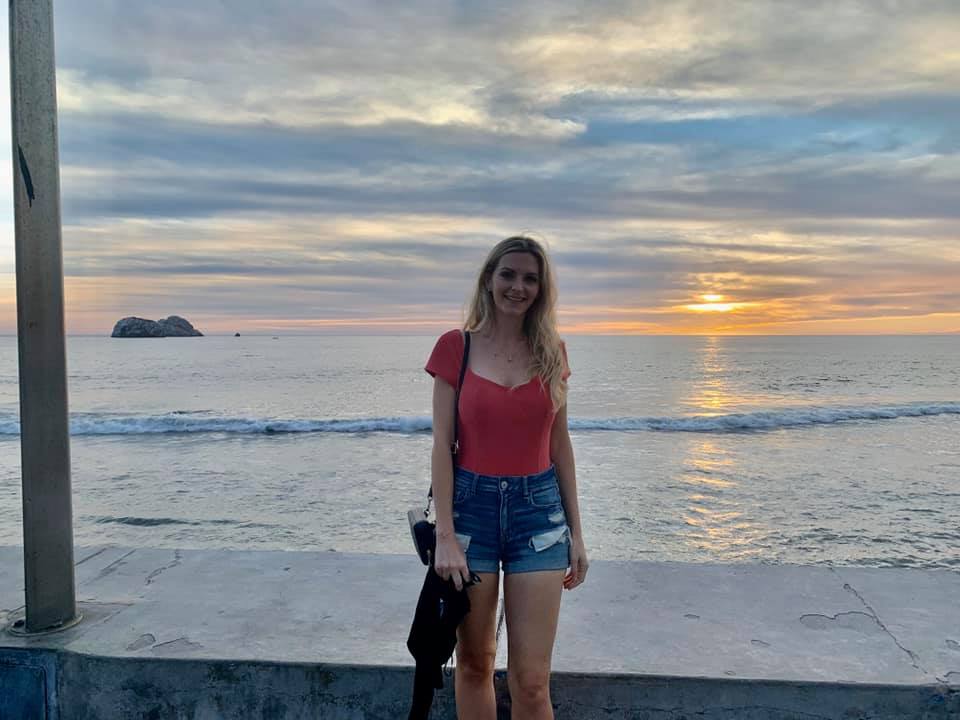
Meet Kashlee Kucheran, a digital nomad with itchy feet, whose TravelOffPath website is growing rapidly in popularity as she focuses on an opportune niche to provide readers with the very latest updates on travel during the corona era. But not for just one country, as we did, but for the whole world.
Keeping such a close eye on the latest developments all over the world, as well as moderating a very active online community for digital nomads looking for the best places to travel to in this strangest of years, Kashlee has a very rounded perspective on current digital nomad trends, interests and preferences. As such, she was invited to be a keynote speaker at the recent Dubrovnik for Digital Nomads conference, where her presentation was one of the highlights of a very entertaining opening day. Read more in "Croatia Has the Potential To Be World's Number 1 Digital Nomad Destination"
I contacted Kashlee after the conference, and she kindly agreed to an email interview about Croatia's digital nomad opportunity.
1. You have been on the road for more than three years, and your successful Travel Off Path blog has become essential reading for digital nomads in the corona era. Tell us firstly when Croatia first came on the radar for you as a digital nomad destination.
Being a digital nomad, I am always on the lookout for new and trendy options to base myself out of for a while. Most of the places nomads frequent are destinations like Thailand, Bali, Vietnam, etc, and as much as I love them all, they all start to blend together. Personally, I have been yearning for a digital nomad destination that has a different feel and scene to it. When I stumbled upon Croatia as a new potential country, I had that “Aha! This is what I’ve been looking for” sort of moment. A country with totally different vibes, from the architecture, to the culture, to the weather, all of which completely appeal to me.
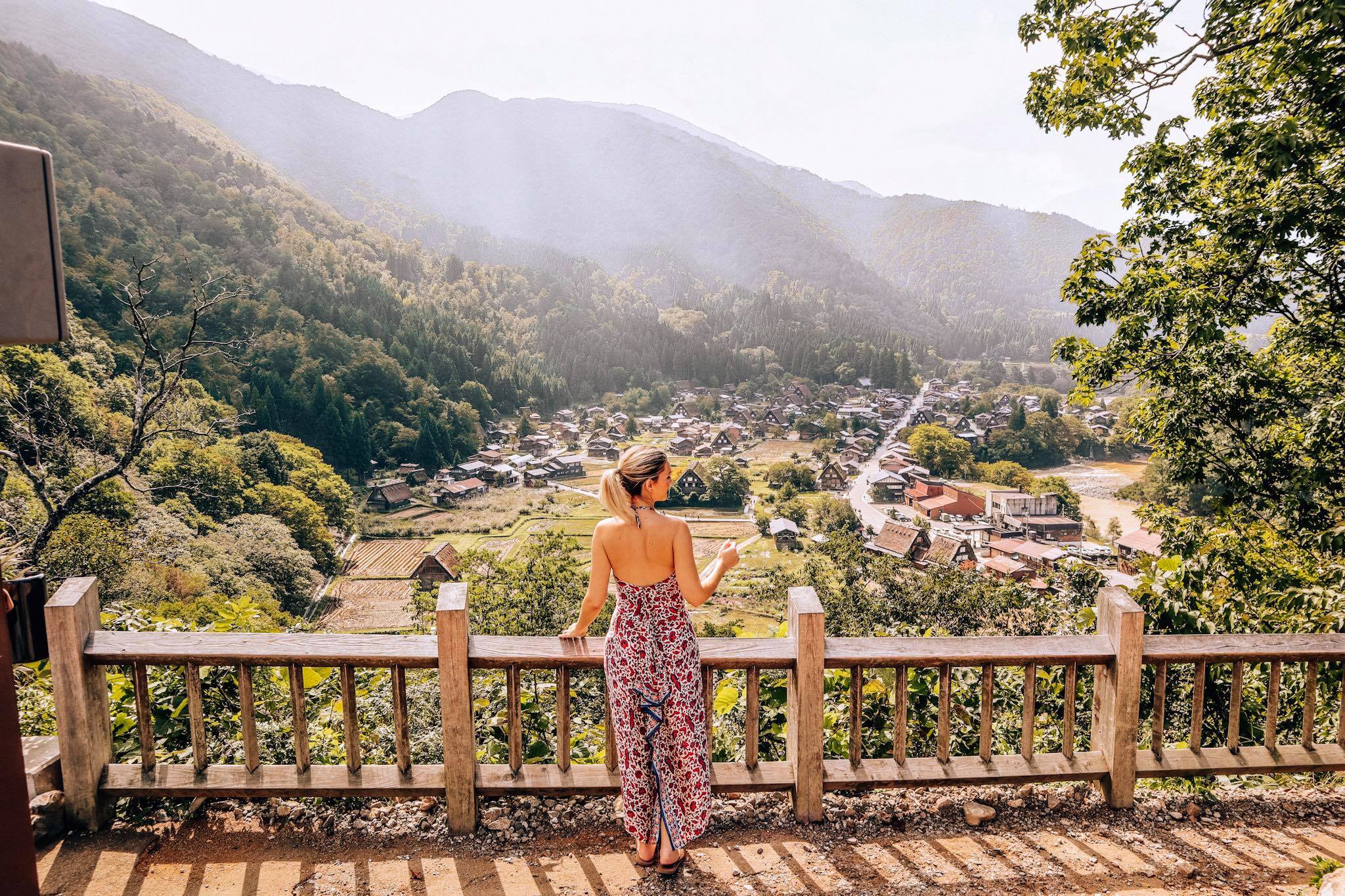
2. During the conference, you stated that interest in Croatia was 'absolutely buzzing' right now. When did you notice the rise in interest in Croatia, and what do you think caused it?
If there was a way I could extrapolate the use of the word ‘Croatia’ being mentioned on my website, in my Facebook groups, and in my DM’s, you would see a graph with a sharp and sudden rise. Croatia has been on the tip of everyone’s tongue lately, especially with American digital nomads, who by the way are a group expected to reach 10 million in size by the end of 2020.
I first noticed the extreme bump in popularity when the rest of the European Union, along with all the South East Asian countries that nomads frequent, shut their doors to most foreign tourists. American, or US citizens, make up the largest group of worldwide nomads, and they found themselves locked out of all their normal go-to destinations. However, Croatia made the bold and progressive decision to allow American tourists, along with all other nations, as long as they came with a negative PCR test, showing they were virus-free.
What happened was a massive surge in stranded tourists making Croatia their destination of choice, since the nation was welcoming them with open arms. We saw people from all over the world, but especially the USA, suddenly changing their itineraries and plans and making their way to Croatia.
3. What advantages does Croatia currently offer the remote worker on the road in these crazy times compared to more established nomad destinations.
Well, the first advantage is that Croatia will actually let them in! Like I mentioned before, Asian countries like Thailand, Vietnam and Bali are all still closed for tourism. Colombia, another up and coming nomad hotspot was closed from March, finally reopening just this month. The choices for nomads is slowly starting to rebound, but still a fraction of what it was pre-pandemic.
Another advantage is cost. The Caribbean nations currently offering digital nomad visas, like Barbados, Bermuda and Anguilla, all have an astronomical cost of living. Bermuda is in fact the most expensive country to live in on the planet, and if there is anything a nomad values, it’s a reasonable cost of living.
Croatia, while still being in the EU, thankfully has a very reasonable cost of living coming in lower than Germany, France, Italy, and even Greece. It also has a much lower cost of living than the countries where most nomads are from, including Canada, the US, Australia, and the UK.
4. Let's imagine life goes back to normal and everything opens, and it is as safe to travel again as before. Would the Croatian nomad beacon still be shining as brightly, or is it largely due to a specific set of circumstances?
If tomorrow the pandemic suddenly ended, and all countries reopened with no restrictions, I still firmly believe that Croatia is still positioned to be one of the top, IF not the top, digital nomad destination.
Some of my reasoning for this include:
Fear of the unknown – Even if the pandemic ended, people are going to be apprehensive about travelling so far from home, to countries that experienced extreme lockdowns. They are going to want to stay a little closer to home, a little closer to first-world health care, and to have easier access to international airports. Heading back down to South East Asia might be overwhelming for many who are concerned about second-waves, re-closures and potentially getting stranded once again.
The romantic European dream – Who doesn’t daydream about sipping wine beside the Adriatic sea, while strolling down cobblestone streets, past ancient ruins, into a cute café to set up their laptop for a few hours work? There is an entire romantic notion about Europe that a lot of nomads, especially ones from the West, fantasize about. Sure, nomads can still land in places like Germany or Italy, but those countries don’t have official/legal nomad programs, limiting the amount of time you can spend there, and technically not permitting you to actually ‘work’ from those locations.
Croatia checks all the boxes – Digital nomads have a mental checklist of what they require in a live/work environment, and Croatia checks all the boxes, including:
- Access to great health care
- Favorable weather
- Good cost of living
- Fast internet speeds
- Connections to major airports
- Accessible entry requirements
- Emerging nomad infrastructure
- Safety
- Trendy culture and community
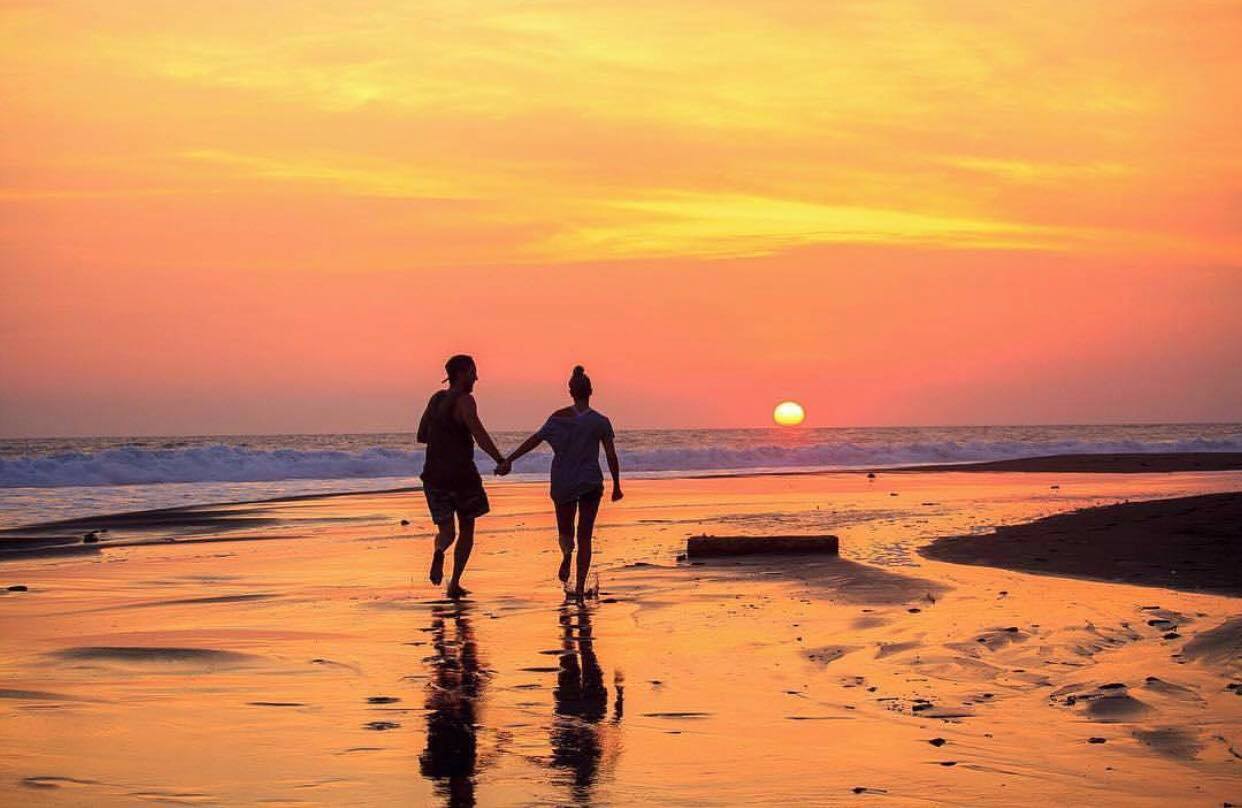
5. Croatia has announced that it will introduce its own digital nomad visa, planned for early 2021, making it only the second in Europe after Estonia, and the seventh in the world. What advice do you have for the Croatian government about the conditions of that visa? I understand that they will include proof of no criminal record, health insurance, and a regular income which is planned to be lower than the 3500 euro a month in Estonia and $5000 a month in Dubai.
If I had a direct line to the government of Croatia with advice on how to effectively proceed with the framework of the Digital Nomad Visa, it would include these tips:
Make requirements accessible: Find the sweet spot of making the requirements high enough to attract the target nomad, but not too high to discourage growing entrepreneurs. Since Croatia’s cost of living is lower than many EU nations, the minimum monthly income should reflect that.
Keep entry open: Keep Croatia’s doors open to all nations, with PCR testing of course, to ensure that nomads can continue to have faith in making plans to settle in Croatia.
Make the visa affordable: Estonia’s Visa costs only 100 euros, while Georgia’s is free. Keeping the visa under a few hundred Euros is key to attracting nomads. Some Caribbean nations are charging $2000 for a 1-year visa, completely missing the mark. When nomads come, and their entire budget isn’t eaten up with legal formalities, that is just more cash they will inject into the local economy.
Re-consider taxing nomads: Under all the current digital nomad visas being offered worldwide, only ONE of them (Estonia) taxes nomads, and that is only after 6 months of being in the country continuously. If Croatia is considering taxing nomads under their DN visa, I believe the program will crumble. Nomads will instead choose other countries with less restrictive programs, or continue to live/work in countries, mostly in South East Asia, on (albeit technically illegal) terms.
6. During your presentation, you said that Croatia has the potential to be the number one digital nomad destination in the world. And you have yet to visit! You clearly have unique insights due to the website that you run. Why do you believe Croatia can be number 1?
I believe Croatia can be number one because of its great placement in Europe, having less repressively year-round hot weather that many nomads are looking to escape, having a unique culture and history, and of course being drop-dead gorgeous.
It sounds funny to make such a claim about a country I have yet to visit, but being a digital nomad myself for years gives me an insight to what nomad ‘wants’ and ‘needs’ are.
For many years, I chose South East Asian countries because quite frankly that is where everyone went, the DN infrastructure was set up incredibly fast, and there were hardly any other options that offered an actual above-board program. Having options beyond the well-beaten nomad path is a breath of fresh air to this lifestyle.
7. You source information about the latest corona travel restrictions all over the world to help travellers, which must be an exhausting job. How do you source this material to stay up-to-date - both globally and specifically from Croatia.
You’re right! It is an exhausting job, but I love it.
Travelers all over the world are beyond frustrated at the ever-changing travel bans and strange new rules, and I love being able to offer some clarity and assistance in these trying times.
Our team at Travel Off Path work tirelessly every day to get the most up to date information about worldwide travel news, entry requirements, and other vital resources for traveling in a Covid-era world.
We get our information direct from government sources, like embassies, consulates, border police, Ministries and other local authorities, in order to be as accurate and helpful as possible. Sometimes we use local press, like Total Croatia News, who are on the ground and have valuable insights that government sites don’t report on. We also have a Facebook Group where world travelers share their personal experiences around the globe right now, offering first-hand insightful perspectives.
With the information we have been able to consistently source from the Government of Croatia, and local Croatian news, we’ve made in-depth guides how to enter Croatia during Covid, especially for travellers who are locked out of most countries
8. The Dubrovnik for Digital Nomads conference was the first such conference for Croatia. Together with the City of Dubrovnik, Dubrovnik Tourist Board, Tanja Polegubic and her fabulous Saltwater team, and Total Croatia News, we will be organising an international competition for digital nomads to stay for a month in Dubrovnik for free, while helping the city (and wider region) develop a strategy to make it more welcoming and visible to the digital nomad community. During the conference, you said that you would be happy to join us in April. Can we get a confirmation, and how does the prospect of a month in Dubrovnik in April sound right now with you back in British Columbia with the Canadian winter to look forward to?
As you’re interviewing me, I’m looking out the window of my hotel room in Osoyoos, British Colombia Canada, and it’s snowing. As a nomad who hasn’t seen winter in over 5 years, the sound of coming to Croatia in April has me packing my bags with anticipation!
I am overjoyed and delighted to be a part of testing out Croatia’s new digital nomad visa, and I honestly cannot wait to see first-hand what all my readers are raving about.
I have no doubts that Croatia won’t just be a place I visit for 1 month but will most-likely become a part of my future story.
****
Itchy feet in these uncertain times? Follow the latest on where and how to travel with Kashlee Kucheran's TravelOffPath website, or join the TOP Facebook community.
More from the Dubrovnik for Digital Nomads conference:
Croatia Through the Eyes of a Digital Nomad: Croatia Courts the Global Workforce.
Reflections on Croatia's First Digital Nomad Conference in Dubrovnik.
After the Visa, Jan de Jong Announces Croatian Digital Nomad Association.
"Croatia Has the Potential To Be World's Number 1 Digital Nomad Destination"
For the latest about the digital nomad scene in Croatia, follow the dedicated TCN news section.
Valamar Invites All Digital Nomads to Istria and Krk Island
October 23, 2020 - Valamar invites all digital nomads to Istria and Krk Island as part of its 'long stay offer,' valid until March 2021.
Valamar is the latest to include a "long stay offer" or accommodation rental for at least one month, which is valid from September 30, 2020, to March 31, 2021.
HRTurizam reports that the special offer can be used in two Valamar camping resorts that are open all year round - Istra Premium Camping Resort 5 * in Poreč and Ježevac Premium Camping Resort 4 * on the island of Krk.
"The service of renting mobile homes for longer stays in Valamar's camping resorts is ideal for all guests who want to change the current location of their offices and allow themselves or their employees to work in nature with a fast internet connection," says Bruno Radoš, director of camp operations and regional director at Valamar.
In the package of services at the Istra Premium Camping Resort, guests will be able to use the free shuttle service and use the saunas, indoor pool, and gym at the nearby Valamar Diamant Hotel & Residence. The camp also has a Stay Fit program for exercise, fitness, and recreation through which they will be guided by coaches and other types of sports recreation and entertainment.
The offer also includes a modern camping home by the sea, high-speed internet connection (200/200 Mbit / s), premium family facilities, organized entertainment for children within the Maro Club, Multimedia Game Lounge, and Istra Theater.
"A longer stay in Valamar's camping resorts is ideal not only for guests who want to relax but also for companies that want to provide their employees with the opportunity to move their offices and stay in nature by the sea this fall and winter. When, in addition to all the services and benefits we provide to our guests, we add the excellent price of the accommodation package, which starts at 450 euro per month, we believe that guests will recognize a great opportunity for a long-term stay at sea," added Radoš.
Guests who decide to spend a longer period in Ježevac Premium Camping Resort on the island of Krk also expect opportunities for recreation on the multi-purpose sports field and rich facilities in the Multimedia Game Lounge - an entertainment zone with video games.
There is also a great complement to Valamar's online store Valfresco Direkt with free delivery of ready meals and groceries.
Thus, Valamar joined the new "long stay" trend of opening hotels according to the workspace model, following other global hotel chains, such as Hilton, Marriot, InterContinental, and many others. Also, Booking com and Airbnb have recently introduced options for longer stays in accommodation facilities.
"Digital nomads promote a new way of working and living, and we invite all those who simply want to change their place of residence for a while to come to Istria and the island of Krk and make a good and relaxing use of the coming months," concluded Radoš.
Interestingly, when we look at the bigger picture, Valamar is targeting families, digital nomads, and digital companies that can move their office to the modern campsites.
To read more about digital nomads in Croatia, follow TCN's dedicated page.


